#future Earth map
Explore tagged Tumblr posts
Text
Top 10 Times Plate Tectonics Reshaped Our World (And What's Next!)
Imagine the ground beneath your feet isn’t solid, but rather a giant, slow-moving jigsaw puzzle! That’s exactly what our Earth is like, thanks to something incredible called plate tectonics. For billions of years, the Earth’s rigid outer shell, called the lithosphere, has been broken into huge pieces – tectonic plates – that are constantly, slowly, gliding over a hotter, softer layer beneath.…
#active geology#Amasia#ancient oceans#Andes Mountains#breakup of Pangea#continental collisions#Continental drift#continental rifting#convergent plate boundary#crustal plates#divergent plate boundary#Earth science#Earth&039;s crust#Earth&039;s dynamic past#Earth&039;s interior#Earth&039;s reshaping#earthquake zones#earthquakes#future continents#future Earth map#geological events#geological history#geological processes#geological timescales#geological wonders#global geography.#Great Rift Valley#Himalayan Mountains#how continents move#how volcanoes form
0 notes
Text
Not me high on pregnancy hormones watching the olympics closing ceremony sobbing because of the concept of tectonics
#that world map really got me lol#like the earth is changing and cities that are close are gonna be not close in the distant future#😭#and continents will separate and others will join and and and#😭😭😭#hormones are wild lol#pregante#pregnant#pregnancy#self post#text#text post#rambles#ramblings#lol#196#olympics#olympics 2024
10 notes
·
View notes
Text
Continuation of this
BEHOLD, MY CREATION
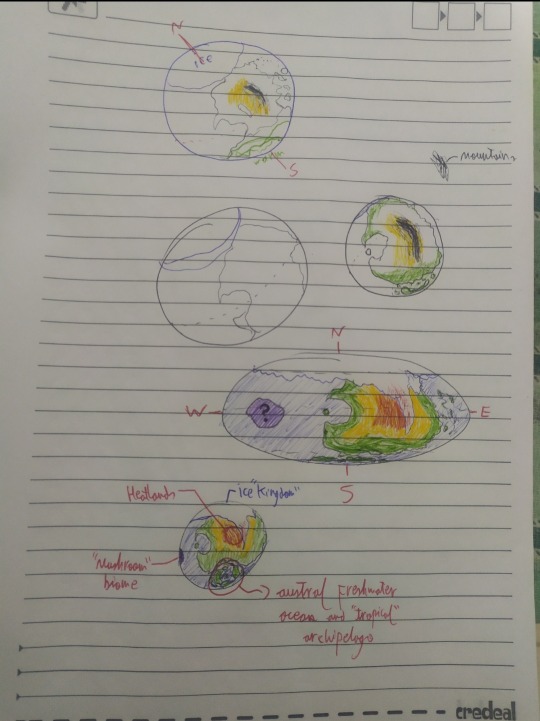
Also, croc-descendants and dinosaurs still exist because of course they do. And specially those commonly mentioned organisms which are older than dinosaurs and still exist
#worldbuild#worldbuilding#map#globe#future fiction#supercontinent#science fiction#sci fi#xenofiction#autistic artist#plural artist#fiction#nd fiction#nd artist#future earth
12 notes
·
View notes
Photo

I'm trying to experiment with drawing maps, and to start here is the 2.0 map of the (currently unnamed) world of my Midnightverse project! It's a future Earth so I traced over Earth's geography and adjusted as I pleased. I plan on adding biomes, nations, etc. later
7 notes
·
View notes
Text
Microscopic defects in ice influence how massive glaciers flow, study shows
New Post has been published on https://thedigitalinsider.com/microscopic-defects-in-ice-influence-how-massive-glaciers-flow-study-shows/
Microscopic defects in ice influence how massive glaciers flow, study shows


As they seep and calve into the sea, melting glaciers and ice sheets are raising global water levels at unprecedented rates. To predict and prepare for future sea-level rise, scientists need a better understanding of how fast glaciers melt and what influences their flow.
Now, a study by MIT scientists offers a new picture of glacier flow, based on microscopic deformation in the ice. The results show that a glacier’s flow depends strongly on how microscopic defects move through the ice.
The researchers found they could estimate a glacier’s flow based on whether the ice is prone to microscopic defects of one kind versus another. They used this relationship between micro- and macro-scale deformation to develop a new model for how glaciers flow. With the new model, they mapped the flow of ice in locations across the Antarctic Ice Sheet.
Contrary to conventional wisdom, they found, the ice sheet is not a monolith but instead is more varied in where and how it flows in response to warming-driven stresses. The study “dramatically alters the climate conditions under which marine ice sheets may become unstable and drive rapid rates of sea-level rise,” the researchers write in their paper.
“This study really shows the effect of microscale processes on macroscale behavior,” says Meghana Ranganathan PhD ’22, who led the study as a graduate student in MIT’s Department of Earth, Atmospheric and Planetary Sciences (EAPS) and is now a postdoc at Georgia Tech. “These mechanisms happen at the scale of water molecules and ultimately can affect the stability of the West Antarctic Ice Sheet.”
“Broadly speaking, glaciers are accelerating, and there are a lot of variants around that,” adds co-author and EAPS Associate Professor Brent Minchew. “This is the first study that takes a step from the laboratory to the ice sheets and starts evaluating what the stability of ice is in the natural environment. That will ultimately feed into our understanding of the probability of catastrophic sea-level rise.”
Ranganathan and Minchew’s study appears this week in the Proceedings of the National Academy of Sciences.
Micro flow
Glacier flow describes the movement of ice from the peak of a glacier, or the center of an ice sheet, down to the edges, where the ice then breaks off and melts into the ocean — a normally slow process that contributes over time to raising the world’s average sea level.
In recent years, the oceans have risen at unprecedented rates, driven by global warming and the accelerated melting of glaciers and ice sheets. While the loss of polar ice is known to be a major contributor to sea-level rise, it is also the biggest uncertainty when it comes to making predictions.
“Part of it’s a scaling problem,” Ranganathan explains. “A lot of the fundamental mechanisms that cause ice to flow happen at a really small scale that we can’t see. We wanted to pin down exactly what these microphysical processes are that govern ice flow, which hasn’t been represented in models of sea-level change.”
The team’s new study builds on previous experiments from the early 2000s by geologists at the University of Minnesota, who studied how small chips of ice deform when physically stressed and compressed. Their work revealed two microscopic mechanisms by which ice can flow: “dislocation creep,” where molecule-sized cracks migrate through the ice, and “grain boundary sliding,” where individual ice crystals slide against each other, causing the boundary between them to move through the ice.
The geologists found that ice’s sensitivity to stress, or how likely it is to flow, depends on which of the two mechanisms is dominant. Specifically, ice is more sensitive to stress when microscopic defects occur via dislocation creep rather than grain boundary sliding.
Ranganathan and Minchew realized that those findings at the microscopic level could redefine how ice flows at much larger, glacial scales.
“Current models for sea-level rise assume a single value for the sensitivity of ice to stress and hold this value constant across an entire ice sheet,” Ranganathan explains. “What these experiments showed was that actually, there’s quite a bit of variability in ice sensitivity, due to which of these mechanisms is at play.”
A mapping match
For their new study, the MIT team took insights from the previous experiments and developed a model to estimate an icy region’s sensitivity to stress, which directly relates to how likely that ice is to flow. The model takes in information such as the ambient temperature, the average size of ice crystals, and the estimated mass of ice in the region, and calculates how much the ice is deforming by dislocation creep versus grain boundary sliding. Depending on which of the two mechanisms is dominant, the model then estimates the region’s sensitivity to stress.
The scientists fed into the model actual observations from various locations across the Antarctic Ice Sheet, where others had previously recorded data such as the local height of ice, the size of ice crystals, and the ambient temperature. Based on the model’s estimates, the team generated a map of ice sensitivity to stress across the Antarctic Ice Sheet. When they compared this map to satellite and field measurements taken of the ice sheet over time, they observed a close match, suggesting that the model could be used to accurately predict how glaciers and ice sheets will flow in the future.
“As climate change starts to thin glaciers, that could affect the sensitivity of ice to stress,” Ranganathan says. “The instabilities that we expect in Antarctica could be very different, and we can now capture those differences, using this model.”
#ambient#Antarctic#Antarctica#Behavior#Capture#change#chips#climate#climate change#crystals#data#EAPS#earth#Earth and atmospheric sciences#Environment#Fluid dynamics#Fundamental#Future#glaciers#Global#Global Warming#how#ice sheet#insights#it#LED#map#marine#mass#measurements
0 notes
Text

What We Learned from Flying a Helicopter on Mars

The Ingenuity Mars Helicopter made history – not only as the first aircraft to perform powered, controlled flight on another world – but also for exceeding expectations, pushing the limits, and setting the stage for future NASA aerial exploration of other worlds.
Built as a technology demonstration designed to perform up to five experimental test flights over 30 days, Ingenuity performed flight operations from the Martian surface for almost three years. The helicopter ended its mission on Jan. 25, 2024, after sustaining damage to its rotor blades during its 72nd flight.
So, what did we learn from this small but mighty helicopter?
We can fly rotorcraft in the thin atmosphere of other planets.
Ingenuity proved that powered, controlled flight is possible on other worlds when it took to the Martian skies for the first time on April 19, 2021.
Flying on planets like Mars is no easy feat: The Red Planet has a significantly lower gravity – one-third that of Earth’s – and an extremely thin atmosphere, with only 1% the pressure at the surface compared to our planet. This means there are relatively few air molecules with which Ingenuity’s two 4-foot-wide (1.2-meter-wide) rotor blades can interact to achieve flight.
Ingenuity performed several flights dedicated to understanding key aerodynamic effects and how they interact with the structure and control system of the helicopter, providing us with a treasure-trove of data on how aircraft fly in the Martian atmosphere.
Now, we can use this knowledge to directly improve performance and reduce risk on future planetary aerial vehicles.

Creative solutions and “ingenuity” kept the helicopter flying longer than expected.
Over an extended mission that lasted for almost 1,000 Martian days (more than 33 times longer than originally planned), Ingenuity was upgraded with the ability to autonomously choose landing sites in treacherous terrain, dealt with a dead sensor, dusted itself off after dust storms, operated from 48 different airfields, performed three emergency landings, and survived a frigid Martian winter.
Fun fact: To keep costs low, the helicopter contained many off-the-shelf-commercial parts from the smartphone industry - parts that had never been tested in deep space. Those parts also surpassed expectations, proving durable throughout Ingenuity’s extended mission, and can inform future budget-conscious hardware solutions.

There is value in adding an aerial dimension to interplanetary surface missions.
Ingenuity traveled to Mars on the belly of the Perseverance rover, which served as the communications relay for Ingenuity and, therefore, was its constant companion. The helicopter also proved itself a helpful scout to the rover.
After its initial five flights in 2021, Ingenuity transitioned to an “operations demonstration,” serving as Perseverance’s eyes in the sky as it scouted science targets, potential rover routes, and inaccessible features, while also capturing stereo images for digital elevation maps.
Airborne assets like Ingenuity unlock a new dimension of exploration on Mars that we did not yet have – providing more pixels per meter of resolution for imaging than an orbiter and exploring locations a rover cannot reach.

Tech demos can pay off big time.
Ingenuity was flown as a technology demonstration payload on the Mars 2020 mission, and was a high risk, high reward, low-cost endeavor that paid off big. The data collected by the helicopter will be analyzed for years to come and will benefit future Mars and other planetary missions.
Just as the Sojourner rover led to the MER-class (Spirit and Opportunity) rovers, and the MSL-class (Curiosity and Perseverance) rovers, the team believes Ingenuity’s success will lead to future fleets of aircraft at Mars.
In general, NASA’s Technology Demonstration Missions test and advance new technologies, and then transition those capabilities to NASA missions, industry, and other government agencies. Chosen technologies are thoroughly ground- and flight-tested in relevant operating environments — reducing risks to future flight missions, gaining operational heritage and continuing NASA’s long history as a technological leader.
youtube
You can fall in love with robots on another planet.
Following in the tracks of beloved Martian rovers, the Ingenuity Mars Helicopter built up a worldwide fanbase. The Ingenuity team and public awaited every single flight with anticipation, awe, humor, and hope.
Check out #ThanksIngenuity on social media to see what’s been said about the helicopter’s accomplishments.
youtube
Learn more about Ingenuity’s accomplishments here. And make sure to follow us on Tumblr for your regular dose of space!
5K notes
·
View notes
Text
Error 404: Spin-off


Summary: A LADS self-aware!AU featuring Sylus and a player. Update: Sylus went ahead and got himself mortalized (That's it, that's the plot). Tags: player!reader x sylus, fem!reader x sylus, reader x lads, self-aware!au, suggestive language, slight crack (literally. lmao, you’ll see), FLUFF! A/N: Finally starting the spin-off! Hello again 🙂↕️🫶🏼 I’ve got a rough outline for the flow and a few key chapters mapped out, but I’m keeping it flexible for the most part. This isn’t gonna be a full structured story, so think more like vignettes of their life, w/ some world-building here and there (laying some groundwork for future chapters hehe). Come thru if you wanna see what error!Sylus and our lil player are up to post-reality jump 🙂↕️🙏🏼 Also: no posting schedule! I’m treating this like a chill side project I can pick up whenever, so not every part’s gonna be lengthy/that polished hehe. Mostly short snippets, unless the chapter calls for a longer one. (P.S. Just send a DM if you want to be taken off the taglist lol. I just assumed you guys would still want to follow along, but no pressure at all if you don’t! 💕)

(main series) - Pt. 1 - Pt. 2
You keep waiting to wake up.
For the sound of your phone alarm to blare somewhere beneath the covers, forcing you to fish it out at seven-thirty-something in the morning. For this absolutely wonderful, absolute mindfuck of a dream, to end—and for the real world to set in.
For another uneventful day to begin, the way it usually does after a short reprieve from the hustle and the bustle of life.
From behind the bathroom door, the sound of the shower cuts off.
You scramble to open the cupboard overhead, grabbing the pepper shaker from the first shelf. You do four rotations over the half-cooked omelette before flipping it over with a rubber spatula, trying not to lose your cool. Or what’s left of it.
Three days. It’s been three days since it dawned on you that Sylus has actually managed to cross the threshold – through a tiny, impossible fissure in the fabric of reality – just to get to this dimension. Your dimension.
Three days since you locked eyes with the other half of your soul from across a room, no screen separating the two of you for once. No physical barrier to stop him from catching you as you ran toward him past the counter, just as twilight kissed the sky goodnight, sobbing at the first touch of his skin—electric against yours. The taste of his lips, the bittersweet notes of extant longing and pure bliss blooming on your tongue as he captured your mouth in his; the two of you lost in each other, uncaring of anything beyond that precious, shared moment.
And three days for your mind to finally catch up to the sheer impossibility of it all.
As far as your Sundays go, you’d say this one takes the cake.
He’s been staying in a modest little rental just a couple of blocks away from you. Nothing extravagant – just a transient house he’s leased for the week. Not that you’ve technically been inside to know; he only pointed it out once, the single-storey residential from across the main street, as the two of you were heading back home—your home. To your little studio apartment.
Him. Sylus. In your condo. You can’t even begin to wrap your head around it.
You know that he’d just arrived in town two days before that fateful encounter at the bistro. That he’d already done his research to know exactly where you were going to be during that hour, and that he’s been here, on Earth, for quite some time now. Even before meeting you.
But past this knowledge, you haven’t actually covered much of anything, really. Just this little awkward dancing around you’ve been doing since you’ve been together.
And you know you should ask, probe, have him break down the hows of his existence to you, a clearer timeline of exactly when he popped into this world, what he’s been up to in all the time he’s been here… and why he’s even waited so long to come to you directly.
You’re painfully aware that it’s just you who’s keeping yourself from getting the answers you want. You’re the one making this harder than it needs to be. You can’t help it.
There’s no manual to tell you how to deal with your emotions when your virtual lover appears in front of you, in the flesh, miraculously defying all laws of physics in the process. No handbook telling you what to do next when something you’ve been wishing for every night before going to bed – for the past two years – actually manifests into being.
Someone you’ve always longed for, staked deep within the confines of your heart, but never truly imagined the consequences of until your wishful thinking bled into reality.
And now he’s here.
All things considered, you think you’ve done an okay job at acting like everything’s normal. Mostly. Probably.
(You haven’t.)
The day after he showed up at your proverbial doorstep, you almost couldn’t believe everything that had transpired a mere twenty hours ago was even real. That maybe your brain had just gotten creative enough to invent a Hallmark-worthy scene to win you a one-way trip to your therapist—and that, maybe, you’d conjured him up simply because you missed him and you’re so down bad, your mind decided to start playing tricks on you.
...which nearly had your soul catapulting out of your body at the sight of the—extremely corporeal, extremely attractive—raven-haired (!) man moving through your kitchen the first morning he stayed over, wearing a black V-neck and a pair of grey sweatpants, ambling barefoot like he already knew the place by heart.
You suppose he does, you allow cautiously, an odd sort of warmth blooming in your chest at the thought. Of course he would.
Still. It didn’t erase the surrealness of seeing Sylus, the Sylus—mortal, perfect, wonderfully alive—brewing you a cup of coffee at nine in the morning, your brain failing to fully comprehend the image of his towering figure working your faulty, secondhand De’Longhi like a pro.
"Are you," he started, eyes zooming in on the spot between your thumb and forefinger, mouth twitching like he's trying not to laugh, "pinching yourself?"
You had quickly withdrawn your hand, schooling your face into a poor attempt at nonchalance as you reached for the steaming blue mug he was holding out to you. "...No."
You can't help but hover around him, like some weird satellite desperate for orbit. You find yourself sneaking glances every five seconds—and more often than not, he meets your gaze with a wayward look of his own.
He never calls you out on it; he just gives you an infuriatingly impish smirk that sends your heart into overdrive, making you feel younger than you are.
You’re still stewing over the events of the past few days, absentmindedly worrying whether the eggs needed more salt, when you hear the bathroom door open.
You whip your head around, and all systems crash to a stop.
Oh god. Oh fuck.
He’s standing there—all six-foot-five of pure, lean muscle, like sin sculpted out of marble and left to walk your unvacuumed parquet wood floor without so much as a care for the cluttered little living space he’s in, looking completely at ease. Fresh from the shower, steam rising lazily from every inch of bare skin laid out in front of you, and it’s like The Neuron™ in your brain activates. The towel slung low across his hips leaves absolutely nothing to the imagination, reducing your thoughts monosyllabic, like some half-evolved primate ready for mating season or whatever. Hot man. Hot man shirtless. Involuntarily, your eyes track a stray rivulet sliding down; right where the faintest suggestion of a happy trail (!!!) begins and ends… and you’re gone. Lost in some kind of trance.
Utterly hypnotised, you watch as it soaks into the edge of the borrowed sage green terry cotton, faintly wondering if what’s beneath it could soak you the same way, shit—
A strangled noise slips past your lips.
It’s terrible. You sound like a dying cow. Hot man’s fault. Bad.
A snort breaks you out of your shameless ogling.
Your head jerks up like you’ve been caught red-handed doing something you're not supposed to, guiltily meeting his eyes. You see Sylus already watching you wryly, the heavy drag of his half-lidded stare rooting you in place.
Your face starts to flush red with embarrassment, heat climbing all the way up to your ears.
He’s leaning a shoulder against the doorframe; arms crossed loosely over his chest, completely relaxed, and clearly getting a kick out of whatever expression you’ve got at the moment. His gaze doesn't waver, stuck on you like glue, drinking in every flustered reaction with quiet amusement.
You swallow nervously. His eyes flicker down, tracing the movement of your throat, and his lips tug up into a semblance of a smile.
Fuuuuck.
"You already started on breakfast without me, sweetie?" He tuts in mock-disapproval. "I told you it’d take me less than twenty minutes to shower."
You don’t manage much in response, just a dumb, garbled, "mhm, s’okay."
You're completely blanked out at this point—bluescreen dead if you will—except for one panicked thought flashing through your brain: Holy shit, he's practically naked. Sylus Qin from Love and Deepspace is practically naked in my house.
Then, not long after, a chorus of, “oh my god oh my god oh my god” starts looping in your head, overriding what little composure you had left like some raunchy PSA warning you about the dangerous rise of moisture down south.
Sylus cocks his head slightly, sending you a sly, knowing look—one that says he knows exactly what's going on in that overstimulated little brain of yours.
Slowly, he pushes himself off and saunters closer to where you are, taking his time crossing the distance with easy, measured steps. As if he’s in no rush at all to get to you. As if he’s merely curious whether you’ll combust just from him shortening the proximity between your bodies.
(You think you just might.)
And when he’s standing barely a few inches away – close enough for you to feel the heat radiating off him – Sylus leans down, effectively trapping you between the counter and the solid wall of his chest. Between granite and sinew.
You lose all capacity to speak.
Without breaking eye contact, he reaches out a hand to shut off the burner stove behind you with an easy flick of his wrist, the brief brush of his arm sending a shiver down your spine. Then, with maddening tenderness, he pinches your cheek between two fingers—his thumb caressing the spot right after.
In a voice filled with faux sympathy, he coos, “What’s got you all distracted, poppet?”
He’s teasing. You know he’s teasing.
He’s done nothing but tease you with his devastatingly good looks, his overwhelming presence, and syrupy words spoken so sinfully in that low cadence of his voice, ever since he arrived. And, oh, you’re not sure whether to scream or kiss the smug look off his face silly.
You’re so bad at being subtle. You always have been, especially when it comes to him. And you know you can’t hide anything from Sylus – from the smallest flicker of microexpression on your face, down to the shortness of your breath. Both of you know this. Both of you painfully aware of the effect he has on you.
And just as much, you know he’s been holding himself back—that no matter how flirtatious he gets, he’s still keeping enough control to pull away whenever you start to get too overwhelmed.
Despite his provocations, Sylus never pushes. He waits, patiently. Giving you the space to volley back if you want to. And if you don’t, he backs off in a second, with the same effortless ease he uses to tease you. Leaving you room to breathe again.
Rinse, repeat.
It’s almost as if you two are playing a game with poorly drawn rules. You don’t know who’s winning.
The little spell breaks when you feel a disgruntled meow against your shin; it's immediately followed by a cat headbutting you, twice in succession, with a surprising amount of aggression.
"Not used to sharing your mother, are you?" Sylus sighs, pulling back from where he’d been caging you in—his movements slow, reluctant.
A warning hiss rises from below. He raises his hands in mock surrender, stepping back to a safer distance, just out of swiping range.
"Yes, yes. You win,” he grumbles in acquiescence at the testy feline, a comically put-upon look on his face. “For now.”
You pull your eyes away from his bicep—look, you're just a girl, okay—to blink down at the temperamental little creature who’s now self-appointed himself as your personal foot guard.
He’s making some vague, cryptic noises, something between a purr and a growl, while keeping his eyes locked firmly on Sylus’ leg.
"He–um, he might just be hungry," you manage to mutter. A quick glance at the food bowl says otherwise. "...or not."
Sylus huffs under his breath, a low sound, equal parts understanding and mildly affronted. He tilts his head – eyes narrowing at the untouched kibble, then to the small furry menace claiming your feet like a jilted lover.
Unfortunately, Maru’s reception to the new person has been... less than cordial.
From the moment Sylus walked in the apartment, Maru had hissed at him as if to say: There is no reason for a Man to be here, before darting beneath the coffee table – tail lashing with all the theatrics of a petulant child. The churlish product of a mother who's been single for far too long, that he’s decided he’s the only boy she’ll ever need.
It strikes you as a little odd. He never usually gets antsy around guests, and you'd even thought he and Sylus got along—or at least, back when the man in question was confined to mere pixels on screen.
Maybe you shouldn’t have counted on that.
Sylus, to his credit, hasn't once tried to close the distance or force a peace treaty. Amused, definitely; the way his eyes glint whenever Maru glares at him could almost qualify as charmed. But since stepping into your home, he’s been mindful about giving the creature a wide berth, moving with the quiet understanding that respect here is sacrosanct, something to be earned. That he’s the one imposing, and the truce between him and the (true) man of the house is a fragile, delicate thing.
You honestly haven’t decided if Maru’s behaviour is because he’s protective... or just pissed that someone else is hogging your attention.
"It’s alright, sweetie," Sylus—your son’s chosen rival—soothed you reassuringly; his hand rubbing a slow, comforting circle over the small of your back when he caught the slightly crestfallen look on your face. "He’s just feeling territorial about his space right now. Give it some time."
“I’ll get dressed,” Sylus murmurs. “Don’t start on the coffee without me.” He presses a kiss to your forehead, then another between your brows; the casual, freely-given affection leaves you warm and gooey inside. He turns toward your vanity, where his black duffel bag rests on the small plastic saddle chair.
You watch his retreating figure for a few seconds—long enough for him to glance back over his shoulder, one brow lifted in lazy inquiry. And the look is so familiar; so painfully reminiscent of the one he gives you in-game, right after you’d deliver a ‘slap’ to his ass, that it knocks you a little off-kilter.
… Which might explain why you don’t react fast enough when his eyes flash with mischief, and he casually undoes the knot of his towel.
The fabric drops.
You catch a glimpse—more than a glimpse, hello—of the perkiest butt you’ve ever seen in your life, and you spin around so fast you slam your elbow into something undoubtedly solid in the process.
A half-pained, half-mortified wheeze escapes your throat.
"Careful," he calls out to you—and though amusement colors his voice, there's a real thread of worry beneath it, enough to make you want to slam your head against the counter for some inexplicable reason. "Don’t feel the need to grant me modesty on my behalf, kitten."
"Kitten’s about to kill herself," you lament with a whine.
It earns you an unimpressed scoff.
“I just got here, my love,” he deadpans without missing a beat. “Daddy’s gonna have to ask you to hold on a little longer.”
You choke on nothing but air. Critical system failure.
Buffering… buffering… buffering…
You inhale sharply.
"Okay, pause," you beg, a slightly hysterical edge to your tone as you claw your way back from a full-blown breakdown. In an attempt to divert the topic, “D’you–uh, do you want anything on your eggs? I’ve got ketchup, hot sauce... barbecue sauce..."
"A proper chef now, are you?" And oh, the next thing you know, he’s right behind you again. Close enough that you can feel the warmth of him through the thin fabric of your shirt.
He smells faintly like your body wash, like Dove nourishing coconut and your calendula shampoo, a heady mix of something sweet and herbal.
The thought of him—of the both of you—smelling the same, actually makes you feel giddy.
What a stupidly trivial, novel thing to find joy in.
Snap the fuck out of it, it’s just soap, you chide to yourself.
You don’t even notice you’re trembling until Sylus curls a large hand around yours; steadying the shaky fingers reaching for the bottle of Cholula on the condiment tray, while his other hand gently cradles your hurt elbow.
Your breath hitches when he presses a kiss to your temple.
"Oh, sweetie," he murmurs, and it’s the way he says it—low and unbearably fond—that loosens some of the tension on your shoulders. "You’ve wound yourself up."
"I'm good," you mumble, though your voice betrays you, thinner than you mean it to sound.
"It's just me," he says, his tone as gentle as the breeze slipping through the open window, ruffling the choppy bangs that frame your face. "Nothing so different from how it’s always been, hmm?"
And you know he’s right. It's just him. Just Sylus. Your Sylus. No different from the one from two years ago.
"I know," you sigh, finally turning to face him, having to crane your neck slightly to meet his eyes.
His expression is softer now, the type of softness reserved solely for you, something that never fails to make you ache. The teasing is gone, tucked away for the time being.
"I just need a little time to wrap my head around this," you admit, voice quieter now. "Is that... is that okay?"
The greys of his eyes melt into something silvery, moonlit—impossibly tender.
In one smooth motion, he lifts you onto the kitchen counter and steps between your legs, closing what little space remains between you. You yelp in surprise, but before you can react, he’s already leaning in, stealing a kiss from your lips. Just a quick one, like he couldn’t help himself, like he needed a taste to hold him over. He chuckles when he sees your wide-eyed look.
"Of course, my love," he says, voice wrought with promise—in love with the way your lips part, bitten pink and unsure, as he lifts your hand to his mouth and presses a kiss to the back of it. "We’ll go as slow as you want. Forever, if that’s what you need." Forever, as what you two have.
…
For over a year, you’ve learned how to enjoy the small things alone. And you did—enjoy it, you mean. Once, almost a lifetime ago, you took for granted the quiet joys of a slower life. But you learned to take it day by day. One hour at a time, minute after minute.
It made room for reflection, and it moulded you into something stronger, and softer, all at once.
But this—with him—brings you back to another time. A sweeter time; the dog-day summer of your life.
The morning hums with a kind of quiet normalcy you’ve grown accustomed to. You’re used to the sunlight spilling through the linen curtains, lining the floor with streaks of honey-gold, soft as a happy memory. Used to the noise of the outside world bleeding through the walls, a constant presence you’ve long since accepted as a permanent fixture in this tiny apartment, like a second heartbeat.
He’s right, in a way.
This isn’t so different from the mornings you once shared with the same man—back when he wore a different face and led an extraordinarily polarized life, completely at odds with yours. The ones spent laughing into a screen, your fingers ghosting across glass, desperate to grasp something you never could.
That life feels like it belonged to someone else now. Someone lonelier.
So, no. Maybe not quite the same – maybe not even close.
–
You finally allow yourself to give in; to sink into the warmth of him, folding yourself smaller in his embrace like a tired bird nestling into a safer sky, your heart fluttering wild and restless against your ribs. Too big for your body, too full to contain. Here – tangled together in this sliver of morning light – everything that has hurt you feels small in comparison. You were never alone to begin with. But with Sylus in your arms, the world feels brighter than you ever remembered it could be.

Tagging: @xxfaithlynxx @browneyedgirl22 @yournextdoorhousewitch @sunsethw4 @stxrrielle @mangooes @hrts4hanniehae @buggs-1 @michiluvddr @ssetsuka @imm0rtalbutterfly @the-golden-jhope @beomluvrr @bookfreakk @ally-the-artistic-turtle @sapphic-daze @sarahthemage @cchiiwinkle @madam8 @slownoise @raendarkfaerie @sylusdarling @luminaaaz @greeenbeean @vvhira @issamomma @blueberrysquire @lovely-hani @fiyori @peachystea @aeanya @sylus-crow @queen-serena88 @xthefuckerysquaredx @rayvensblog @poptrim @goldenbirdiee @amerti @angstylittleb1tch @reiofsuns2001 @j4mergy @touya-apologist @gladiolus-mamacitia @btszn @wrimaira @writingmyladsdelusions @borkunlimited @magnoliaswriteatsunset
#love and deepspace#lads#lnds#love and deepspace sylus#lads sylus#lnds sylus#sylus x reader#sylus x non mc reader#sylus x you#lads x you#lads x reader#love and deepspace fic#self aware au#sylus qin
671 notes
·
View notes
Text
When computer scientists gain entry, as they’re doing, into the presidential palaces and mayors’ offices of the world’s largest cities, it’s not so much to set up shop as it is to explain the new rules of the game: government administrations are now competing with alternative providers of the same services who, unfortunately for them, are several steps ahead. Suggesting their cloud as a way to shelter government services from revolutions — services like the land registry, soon to be available as a smartphone application — the authors of The New Digital Age inform us and them: “In the future, people won’t just back up their data; they’ll back up their government.” And in case it’s not quite clear who the boss is now, it concludes: “Governments may collapse and wars can destroy physical infrastructure but virtual institutions will survive.” With Google, what is concealed beneath the exterior of an innocent interface and a very effective search engine, is an explicitly political project. An enterprise that maps the planet Earth, sending its teams into every street of every one of its towns, cannot have purely commercial aims. One never maps a territory that one doesn’t contemplate appropriating. “Don’t be evil!”: let yourself go.
To Our Friends, The Invisible Committee, 2014
494 notes
·
View notes
Text
Where Have you Been?
This is inspired by this post.
Billy was having a rough day. Scratch that. A rough couple of months. Recently, he’s been… losing himself? He doesn’t know how to put it into words. It’s just that more he’s Marvel, the more he forgets about being Billy. In all honesty, it’s scaring him. What’s even worse is that, no matter what others think, he isn’t in control anymore, and Billy knows it. One moment, he’ll just be Billy Batson and then the next he’ll be Marvel with no recollection of even saying the word. Billy truly wished he hadn’t noticed the gaps in his memory getting bigger.
Speaking of memory gaps, Billy had a pretty big one to fill considering all he did was go to bed, and was then greeted with the misfortune of waking up on a random beach with the lower half of his body slightly wet from the tide. All he knows is that he’s not near Fawcett, let alone Iowa, because last he checked, it was a landlocked state. So, he got up, and decided to go find out where he was.
Billy: *wandering around while shaking any sand off himself, eventually spotting a flag* “Oh! I’m in… I still have no idea.”
Glasses Lady: *approaches him* “Por que você não está na escola?” (Translation: Why aren’t you in school?)
Billy: *frog blinks* “Huh?”
Billy was… pretty sure that was Spanish. So he’s probably still on earth. Maybe. After a little bit of back-and-forth, the Glasses Lady finally realized he couldn’t understand what Billy was only half sure was Spanish. In the end, she just started taking him around to find somebody who could speak English.
Glasses Lady: “¿Você fala inglês? Acho que este é o filho de um turista.” (Translation: Do you speak English? I think this is a tourist's son.)
Old Granny: “Não. Pobre garoto.” *leans down to pinch his cheek* (Translation: “No. Poor boy.)
Billy: *confused as to why this random old lady is pinching his cheek*
Eventually, after a while, they did find somebody who could speak English.
Billy: “Do you know where I am, miss?”
College Student: “You’re in Brazil.”
Billy: “Brazil??” *sounds super concerned* “Isn’t that in South America? I think?”
College Student: “It is. How did you even get here? Are you on vacation?”
Billy: “No? I just woke up here.” *wondering how he’s gonna explain this to Rosa*
College Student: “What?” *also now concerned because she thinks this child might’ve been a victim of trafficking*
Billy: “Uhm… you have like a map that you can show me?”
College Student: “I don’t think a map will help you, bud.”
Billy: *shrugs* “Theres always the chance it could, miss.”
College Student: “I guess?” *pulls up google maps*
Billy: *zooms out so he can just see the countries* “Oh okay. So not that far away.”
College Student: “You’re plenty far away what are you talking about? Also, why’re you sandy?” *wipes off some sand her phone*
Billy: *ignores both questions* “Do you know which way is north?”
College Student: “Uh… it should be that way.” *points in the direction*
Billy: “Oh thank you!” * is about to runoff, but looks back at the Glasses Lady* “And gracias?” *looks to the College Student* “That how you say it right?”
College Student: “No, that’s Spanish.” *shakes head* “It’s supposed to be obrigado.” (Translation: Thank you.)
Billy: “Oh, obrigado!” *definitely butchered the pronunciation and runs off to he north*
College Student: “Wait, come back!”
As soon as Billy was out of sight, he shazamed and flew in the direction she pointed in. Now, the boy wouldn’t admit this, but he actually flew slower than normal. He didn’t wanna think about the future confrontation with Rosa, not to mention his other family members. Was he prolonging the inevitable? Yes. Did he feel guilty? Also, yes. Did that mean he was gonna speed up though? …No.
Billy was just passing over Mexico when his JL comm started going off like crazy.
Marvel: *answers his comm*
Batman: “Marvel. Watchtower. Now.”
Marvel: “Huh? Why did I do something wrong?”
Batman: “You went AWOL for three weeks, and then the first sign we find that you’re alive is a video of you partying at a Mardi Gras parade in Brazil. I really wonder what you did wrong.”
Billy was straight speechless for a solid minute. Three weeks? Three weeks? The memory gap was way bigger than he thought.
Marvel: *trying to find words* “I- I’m gonna be honest I have no idea what you’re talking about.”
He honestly felt like crying. Genuine, ugly, crying. Because now he knows it’s gotten to a point where he can’t shrug this off anymore. He could do one day. He could do two days. He’s even gone a week before. But three weeks? That’s nearly a month and he doesn’t remember anything. Billy was now being forced to acknowledged how big of a problem this was.
By now, he had stopped, still floating in mid air.
Batman: “Is that you confirming you were too intoxicated to reach out to us or-”
Marvel: “Mr. Batman Sir, I really can’t talk right now.” *can feel himself starting to hyperventilate* “I’ll come by later. I promise.”
Batman: “No, not later. Immediately. We all want a word with you.”
Marvel: *grimaces* “I’m sorry. I just really can’t right now. I’m really sorry.” *hangs up*
Billy just started hyperventilating after that. His chest felt tight, his world felt like it was one the brink of crashing down. He needed to go see the wizard. He needed help. The wizard could definitely help. So, he went to the rock.
Wizard: *sounds solemn* “I’m sorry, Billy.”
That was literally all the old man told him before he started talking about how the gods were starting to exert more of their influence on him. And he basically had no say, say in some of the things he would start to do from now on. Just when Billy’s life couldn’t get harder. Please, Gods, give him a break.
735 notes
·
View notes
Note
hii i love your writing SO much <3 could you write nsfw hcs of professor ellie where reader is insecure about her postpartum body? and how ellie would react and all that? tysm babe!
Headcannons: professor!ellie williams x reader

masterlist
professor ellie masterlist
warning: NSFW content! MDNI 18+
☆ Ellie has always been obsessed with your body — long before the pregnancies. She treats you like a subject of study, a poem in flesh.
☆ She’d spend hours worshipping you with her mouth, soft kisses to your stomach and thighs, whispering things like, “No metaphor could ever hold you.”
☆ Ellie had a ritual before bed: kissing your belly three times — once for you, once for your future, and once for herself. She said it was selfish, but necessary.
☆ When you got pregnant with Aurora, Ellie’s obsession only grew. She became more reverent, more possessive. “You’re carrying both of us,” she’d mutter against your skin.
☆ She was especially obsessed with your breasts. The way they changed. The way you’d cup them self-consciously, and she’d replace your hands with hers. “Don’t hide them from me,” she whispered once, lips brushing a nipple.
☆ After you gave birth, you didn’t want her to touch you the same way anymore. The sexiness you felt before — the desire — vanished.
☆ You hated the way your stomach looked. Hated how tender and saggy it felt. You flinched when Ellie reached for you under your shirt.
☆ Ellie noticed quickly, though she didn’t say anything at first. She just started memorizing the new map of your body in silence.
☆ She once got on her knees to kiss your stretch marks, but you moved away. “Don’t,” you said, almost harsh.
☆ That night, she cried in the bathroom. Quietly. Because she didn’t want you to hear how broken she felt for not being able to comfort you.
☆ You stopped letting her eat you out with the lights on. Then with the lights off. Then, not at all.
☆ Ellie went from practically addicted to your taste to starving. Not physically — emotionally. She missed the part of you that allowed her in.
☆ Once, she whispered, “I miss being close to you,” and you replied, “I’m still here,” but you didn’t meet her eyes.
☆ She studies you like literature. The way you change clothes. The way you keep your back turned. The pauses in your sentences when she says “beautiful.”
☆ She writes: “Reader tucks herself into silence. A woman who once let me in now folds herself like a letter never meant to be opened.”
☆ She quotes Toni Morrison during pillow talk: “Love is never any better than the lover.” She tells you she’s learning to love you better — in all the ways you need now.
☆ When you cry in her arms after a long day of mom-ing, she rubs your back and murmurs academic nonsense: “You are the arc of every heroine’s journey — not ruined, rewritten.”
☆ The birth of Arnold leaves you feeling even worse — heavier, more stretched. You can’t imagine being naked in front of Ellie ever again.
☆ You wear nursing bras to bed. You keep the bathroom door locked. Even showers feel like shame now.
☆ You stop initiating sex altogether. Ellie doesn’t push. But she notices every night you turn away, every sigh you try to swallow.
☆ She hears the way you talk to yourself in the mirror. “Ugly,” “used up,” “gross.” It guts her.
☆ One day, she pulls you into her lap fully clothed and cups your face. “Please stop talking about my favorite body like that.”
☆ Ellie starts buying you lingerie. But not lacy, revealing things. Soft, expensive, comforting things — silk and warmth and earth tones. “This one’s the color of your thighs when you blush,” she says, voice low.
☆ She makes it a rule: no more hiding. Not from her. If you change, she wants to be there. If you cry, she’ll hold you through it.
☆ One night, Ellie makes love to you slowly, under the blankets. You’re still in a nursing bra. She worships every inch she’s allowed to touch. “Let me earn the rest.”
☆ When she finally slides her hand down your panties again, you gasp and cry at the same time. She kisses your tears as you come.
☆ Afterwards, she whispers, “You’re mine, in every shape. In every stage. And I will never stop wanting you.”
☆ Ellie takes her time. She tells you she wants to learn your body again. Like a new language. “Every scar. Every dip. Every sigh — I want to read you until I memorize it all again.”
☆ She uses her mouth like a pen. You let her go down on you for the first time in months — only under the covers.
☆ She kisses your soft thighs first, whispering, “These carried our children. These make me feral.”
☆ She eats you like it’s an essay she wants to get an A+ on — deliberate, obsessive, unhurried. Her fingers gripping your hips like she’s grounding herself.
☆ When you finally come, she doesn’t move. She just stays there, lips trembling against your inner thigh, whispering, “Thank you. Thank you for letting me.”
☆ You sob in her arms after. She kisses your eyelids and says, “Let’s do this slowly. One night, one light, one layer at a time.”
☆ Ellie writes you a poem. Not a good one, but a raw one. You find it folded inside your nursing bra drawer.
☆ She whispers literary lines during sex: “I want to do with you what spring does with the cherry trees.” You laugh, and cry, and kiss her harder.
☆ You let her take Polaroids of you — just shoulders and curves. No face. She keeps them in her journal, like talismans.
☆ One day, you ask her to take one with your full body. You say, “I want to see what you see.”
☆ She frames it. Not in your house — but in her university office. Her students think it’s abstract art. She knows better.
☆ You start having sex with the lights on dim. Then brighter. Then fully.
☆ You ride Ellie one night and cry when she won’t stop looking at you. “Why are you staring?”
☆ She answers: “Because you’re so fucking beautiful I’m afraid to blink.”
☆ Ellie becomes obsessed with your belly. She kisses it between orgasms. “This is where they came from. This is where I came from.”
☆ You let her use a mirror during sex one night. It’s overwhelming — but she keeps kissing your shoulder. “Look at how I love you,” she says, moving inside you.
☆ After, she cradles your face and whispers, “This isn’t sex. This is resurrection.”
☆ Ellie never rushes. Postpartum or not, she treats your body like a library she’s not finished reading. Sex begins with her eyes, tracing every new curve with gratitude. She wants to make you slow down and see what she sees.
☆ She always asks, “Can I see you?” — never demands it. The room is softly lit, but when you shake your head, she just nods and kisses your covered shoulder, working with whatever you give.
☆ Her oral fixation deepens after each baby. It’s like she gets more addicted to the idea of devoting herself to your body — especially the parts you try to hide. She’ll stay between your thighs for hours if you let her, mumbling, “This is my favorite place to be.”
☆ Ellie doesn’t let you say anything negative about your body during sex. She’ll stop, tilt her head, and say softly, “Say something real instead. Say you made me a daughter. Say you made me a son. Say you let me have a forever.”
☆ She gently pins your wrists above your head and kisses each stretch mark like a vow. “You stretched for love,” she whispers between every one. “Let me stretch you for pleasure.”
☆ Ellie sometimes coaxes you out of the baggy shirt or the blanket by undressing herself first. She lies back completely bare and says, “Now we’re both soft. Now come let me in.”
☆ If you try to cover your belly during sex, she kisses your hands and says, “Leave it. I want to feel what made them.” And she means it. She needs to feel it.
☆ Her favorite position postpartum becomes one where she can be under you — eating you out slowly with both hands gripping your hips, letting your softness weigh over her. She moans into you like it’s prayer.
☆ Ellie gets more vocal the more insecure you are. She praises you obsessively. “So fucking gorgeous. So warm. So full. I love your thighs, I love your belly, I love the way you drip when I talk to you like this.”
☆ If the lights are off, she’ll light one dim candle and hold it near your waistline as she trails kisses across your stomach. “I’m gonna learn every line like I teach sonnets. Over and over, until it’s sacred.”
☆ She never initiates penetration until you beg for it. The build-up is always about you. “I want you to ask for me. Not because you feel sexy — but because you trust me to hold you while you fall apart.”
☆ When you flinch from her tongue on your scars, she only presses harder — with reverence. “This is where you tore for them. This is where I love you hardest.”
☆ Sometimes she makes you ride her strap with a mirror behind you — not to humiliate, but to show you what she sees: flushed cheeks, soft belly, your hand around her throat. “Tell me you’re ugly now. I dare you.”
☆ Ellie groans like she’s in pain when you cum. Not from dominance — but from desperation. “That’s my girl. My body. My fucking heaven.”
☆ Her oral fixation turns obsessive during ovulation or breastfeeding phases. She says your taste changes — becomes sweeter, richer — and she wants to study every drop.
☆ Ellie doesn’t like when you apologize for being "loose" after birth. She’ll murmur, “It’s not loose. It’s made to take me. Just me. No one else gets this.”
☆ She kisses your breasts with pure awe after nursing. Even if they leak. Especially if they leak. She moans when you gasp, wraps her lips around your nipple, and whispers, “Still feeding them. Still feeding me.”
☆ She loves when you’re sore from motherhood. If your thighs ache, she’ll massage them with her tongue. If your back hurts, she’ll rub it while fingering you from behind slowly — whispering, “You give so much. Let me take over.”
☆ Ellie’s aftercare is half erotic. She traces the wetness down your thighs and says, “Proof you still want. Proof you’re still mine. That didn’t go anywhere.”
☆ She fucks you slow. Even with the strap, it’s like worship — not just sex. Her forehead stays against yours the whole time, whispering how good you feel, how much she missed you, how this part of you never left.
☆ When you're riding her, Ellie gently grabs your hips and holds you in place as she thrusts up with the strap. “Don’t run from what’s yours. You deserve to feel full.”
☆ She sometimes cries when you let her take you fully in the light. She doesn’t even hide it. “I missed you. I missed all of you. I never want to fuck with the lights off again.”
☆ She always starts by eating you out — slow, wet, tongue curling into you while her hand cups your belly, gently grounding you. “Don’t hide from me. Let me taste the parts you’re scared of.”
☆ Ellie teases your stretch marks with her tongue, dragging it over every curve like she's tracing poetry. “You are literature. You are lineage. Let me read.”
☆ She praises you like a professor giving a thesis defense. “Exquisite form. Provocative structure. Flawless conclusion.” She grins when you call her a nerd with tears in your eyes.
☆ Sometimes she teases you by saying she’ll write her next syllabus about you — “Unit 1: the architecture of your thighs. Unit 2: your cunt. Final exam: making you scream my name.”
☆ Ellie sometimes lays between your legs with her hands flat against your stomach and just breathes there, lips ghosting over your folds. “This is the most sacred text I’ll ever study.”
☆ If you try to brush her off when you're bloated, she tightens her grip around your waist and murmurs, “You think this turns me off? No, baby. This makes me feral.”
☆ She’s not rough — but she is unrelenting. Once you let her in, she doesn’t stop until your body breaks open with pleasure. “Let it go. Let it all go. I’ve got you.”
☆ Every orgasm Ellie gives you is earned with worship. It ends with her on her knees, flushed and wrecked, pressing kisses to your swollen thighs, whispering, “That’s my love. That’s the mother of my children. That’s my woman.”
☆ Aurora calls your stretch marks “mommy’s tiger stripes.” Ellie tears up every time she hears it.
☆ Arnold falls asleep on your chest after breastfeeding, and Ellie snaps a picture — the first one you don’t delete.
☆ Ellie keeps it in her office, tucked behind a book called The Motherhood Manifesto.
☆ Aurora starts drawing you as a superhero with big hips and wide arms. You blush. Ellie grins.
☆ Ellie publishes a paper on the literary absence of maternal beauty — and how academia erases softness. She uses quotes from your life. You’re anonymous. But you cry reading it anyway.
She writes: “If the canon cannot hold softness, then I’ll rewrite the canon with my hands.”
☆ You finally ask her to write something about your sex life. A private essay. She does. And you make love on the same desk she types it on.
☆ One quote haunts you: “Her belly, soft and divine, is the altar at which I worship. Each orgasm a prayer. Each moan a vow.”
☆ You catch yourself smiling naked one day. You don’t hate what you see. Ellie catches you. Walks over. Kisses your reflection.
“Told you,” she whispers, “You’d fall for her again.”
☆ The next time you ride her, you keep the lights on bright. She almost cries under you.
☆ “You’re not just back,” she says. “You’re reborn.”
☆ You write her a letter, finally. “Thank you for not letting me vanish.”
☆ Ellie keeps it in her wallet. Reads it on days when the world feels cruel.
☆ She builds a new bookshelf — and the base is engraved with: “Built by the hands that held our children.”
☆ She kisses your hands during foreplay now, every time. “These gave life. These take mine every time you touch me.”
☆ She tells you the shape of your hips haunts her when she’s teaching.
☆ She whispers how your weight on top of her makes her feel safe.
☆ She begs for you now — not just sexually, but spiritually.
☆ She wants a third baby, but only if you do. “I could spend my life memorizing your changes.”
☆ You say yes. Not because you’re perfect. But because you feel loved.
☆ When you make love after the decision, she touches you like she’s already thanking you for the future.
☆ And this time, when she says “You’re everything” — you believe her.
#ellie williams#ellie tlou2 x reader#ellie the last of us#ellie tlou#ellie tlou x reader#ellie williams drabble#ellie williams fanfic#ellie williams fanfiction#ellie williams imagine#ellie williams blurb#ellie#ellie miller#ellie tlou2#ellie willams x reader#ellie williams core#ellie williams fan fic#ellie williams fic#ellie williams fluff#ellie williams hcs#ellie williams headcanons#ellie williams one shot#ellie williams oneshot#ellie williams promlt#ellie williams the last of us#ellie williams tlou#ellie williams tlou2#ellie williams x fem reader#ellie williams x female reader#ellie williams x reader#ellie williams x y/n
152 notes
·
View notes
Text
Dragon Age: The Veilguard: Strangled by Gentle Hands
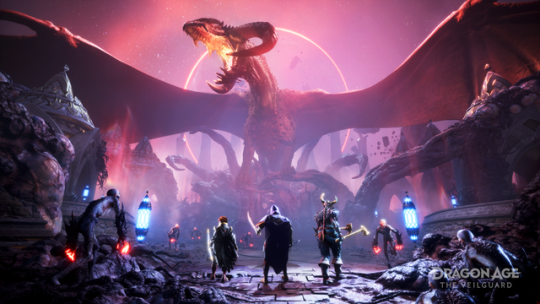
*The following contains spoilers*
“You would risk everything you have in the hope that the future is better? What if it isn’t? What if you wake up to find the future you shaped is worse than what was?”
– Solas, Dragon Age: Inquisition (2014)
I. Whatever It Takes
My premium tickets for a local film festival crumpled and dissolved in my pants pocket, unredeemed as they swirled in the washing machine. Throughout that October weekend in 2015, I neglected my celebratory privileges, my social visits to friends, and even my brutal honors literary theory class. All because a golden opportunity stretched before me: a job opening for a writing position at the once-legendary BioWare, with an impending deadline.
The application process wasn’t like anything I’d seen before. Rather than copy+paste a cover letter and quickly swap out a couple of nouns here and there, this opening required me to demonstrate my proficiency in both words and characters – namely, BioWare’s characters. Fanfiction wasn’t normally in my wheelhouse – at the time, I had taken mainly to spinning love sonnets (with a miserable success rate). But I wouldn’t balk at this chance to work on one of my dream franchises – especially since the job prospects for fresh English BAs weren’t exactly promising. So, I got to work crafting a branching narrative based on the company’s most recent title: Dragon Age: Inquisition. Barely two months prior, I saw the conclusion of that cast’s story when the Inquisitor stabbed a knife into a map and swore to hunt her former ally, Solas, to the ends of the earth. Now it was my turn to puppeteer them, to replicate the distinct voice of each party member and account for how they’d react to the scenario I crafted. And if it went well, then maybe I’d be at the tip of the spear on that hunt for Solas. Finishing the writing sprint left me exhausted, but also proud of my work.
The folks at BioWare obviously felt differently, because I received a rejection letter less than a week later. Maybe they found my story trite and my characterization inaccurate, or maybe they just didn’t want to hire a student with no professional experience to his name. Regardless, I was devastated. It wouldn’t be until years later that I learned that, had my application been accepted, I likely would’ve been drafted into working on the studio’s ill-fated looter shooter, Anthem (2019), noteworthy for its crunch and mismanagement. My serendipitous rejection revealed that sometimes the future you strive to build was never meant to match your dreams. What seemed like an opportunity to strike oil actually turned out to be a catastrophic spill.
Still, my passion for the Dragon Age series (as well as Mass Effect) persisted in the face of BioWare’s apparent decline. I maintain that Inquisition is actually one of the studio’s best games, and my favorite in the series, to the point where I even dressed up as Cole for a convention one time. The game came to me at a very sensitive time in my life, and its themes of faith vs falsehood, the co-opting of movements in history, and the instability of power all spoke to me. But I will elaborate more on that at a later date. My point is, I held on to that hope that, in spite of everything, BioWare could eventually deliver a satisfactory resolution to the cliffhanger from their last title. Or perhaps it was less hope and more of a sunk cost fallacy, as an entire decade passed with nary a peep from Dragon Age.
As years wore on, news gradually surfaced about the troubled development of the fourth game. Beginning under the codename “Joplin” in 2015 with much of the same creative staff as its predecessors, this promising version of the game would be scrapped two years later for not being in line with Electronic Arts’s business model (i.e. not being a live-service scam). Thus, it was restarted as “Morrison”. The project cantered along in this borderline unrecognizable state for a few years until they decided to reorient it back into a single-player RPG, piling even more years of development time onto its shaky Jenga tower of production. Indeed, critical pieces were constantly being pulled out from the foundations during this ten year development cycle. Series regulars like producer Mark Darrah and director Mike Laidlaw made their departures, and the project would go on to have several more directors and producers come and go: Matthew Goldman, Christian Dailey, and Mac Walters, to name a few key figures. They eventually landed on John Epler as creative director, Corinne Busche as game director, and Benoit Houle as director of product development. Then came the massive layoffs of dozens of employees, including series-long writer Mary Kirby, whose work still made it into the final version of DA4. Finally, the game received a rebranding just four months before release, going from Dreadwolf (which it had been known as since 2022) to The Veilguard (2024) – a strange title with an even stranger article.
Needless to say, these production snags did not inspire confidence, especially considering BioWare’s been low on goodwill between a string of flops like Anthem and Mass Effect: Andromeda (2017) and, before that, controversial releases like Dragon Age II (2011) and Mass Effect 3 (2012). The tumult impacted The Veilguard’s shape, which scarcely resembles an RPG anymore, let alone a Dragon Age game. The party size is reduced from four to three, companions can no longer be directly controlled, the game has shifted to a focus on action over tactics a la God of War (2018), the number of available abilities has shrunk, and there’s been a noticeable aesthetic shift towards a more cartoonish style. While I was open to the idea of changing up the combat (the series was never incredible on that front), I can’t get over the sensation that these weren’t changes conceived out of genuine inspiration, but rather vestigial traces from the live-service multiplayer iteration. The digital fossil record implies a lot. Aspects like the tier-based gear system, the instanced and segmented missions, the vapid party approval system, the deficit of World State import options, and the fact that rarely does more than the single mandatory companion have anything unique to say on a quest – it all points to an initial design with a very different structure from your typical single-player RPG. The Veilguard resembles a Sonic Drive-In with a mysterious interior dining area – you can tell it was originally conceived as something else.1
That said, the product itself is functional. It contains fewer bugs than any previous game in the franchise, and maybe BioWare’s entire catalog for that matter. I wouldn’t say the combat soars, but it does glide. There’s a momentum and responsiveness to the battle system that makes it satisfying to pull off combos and takedowns against enemies, especially if you’re juggling multiple foes at once. Monotony sets in after about thirty or forty hours, largely due to the fact that you’re restricted to a single class’s moveset on account of the uncontrollable companions. Still, this design choice can encourage replay value, as it does in Mass Effect, and free respec options and generous skill point allocations offset the tedium somewhat.
While the character and creature designs elicit controversy – both for the exaggerated art direction and, in the case of demons and darkspawn, total redesign – the environmental art is nothing short of breathtaking. I worried that this title would look dated because of how long it had been in development and the age of the technology it was built upon. Those fears were swiftly banished when I saw the cityscapes of Minrathous, the cyclopean architecture of the Nevarran Grand Necropolis, or the overgrown ruins of Arlathan. But like everything in The Veilguard, it’s a double-edged sword. The neon-illuminated streets of Docktown, the floating citadel of the Archon’s Palace, and the whirring mechanisms of the elven ruins evoke a more fantastically futuristic setting that feels at odds with all three previous titles (even though all three exhibited a stylistic shift to some extent). It aggravates the feeling of discordance between this rendition of Thedas and the one returning players know.
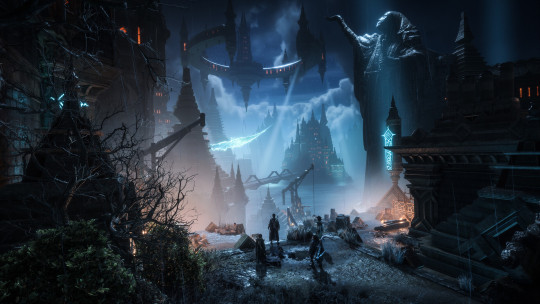
All of these elements make The Veilguard a fine fantasy action-adventure game – even a good one, I’d say. But as both the culmination of fifteen years of storytelling and as a narrative-based roleplaying game – the two most important facets of its identity – it consistently falls short. Dragon Age began as a series with outdated visuals and often obtuse gameplay, but was borne aloft by its worldbuilding, characterization, and dialogue. Now, that paradigm is completely inverted. The more you compare it to the older entries, the more alien it appears. After all these years of anticipation, how did it end up this way? Was this the only path forward?
Throughout The Veilguard’s final act, characters utter the phrase “Whatever it takes,” multiple times. Some might say too many. I feel like this mantra applied to the development cycle. As more struggles mounted, the team made compromise after compromise to allow the game to exist at all, to give the overarching story some conclusion in the face of pressure from corporate shareholders, AAA market expectations, and impatient fans. Whatever it takes to get this product out the door and into people’s homes.
This resulted in a game that was frankensteined together, assembled out of spare parts and broken dreams. It doesn’t live up to either the comedic heights or dramatic gravity of Inquisition’s “Trespasser” DLC from 2015, despite boasting the same lead writer in Trick Weekes. Amid the disappointment, we’re left with an unfortunate ultimatum: It’s either this or nothing.
I don’t mean that as a way to shield The Veilguard from criticism, or to dismiss legitimate complaints as ungrateful gripes. Rather, I’m weighing the value of a disappointing reality vs an idealized fantasy. The “nothing”, in this sense, was the dream I had for the past decade of what a perfect Dragon Age 4 looked like. With the game finally released, every longtime fan has lost their individualized, imaginary perfection in the face of an authentic, imperfect text. Was the destruction of those fantasies a worthy trade? It doesn’t help that the official artbook showcases a separate reality that could’ve been, with a significant portion dedicated to the original concepts for Joplin that are, personally, a lot closer to my ideal vision. I think it would’ve done wonders to ground the game as more Dragon Age-y had they stuck with bringing back legacy characters, such as Cole, Calpernia, Imshael, and the qunari-formerly-known as Sten.
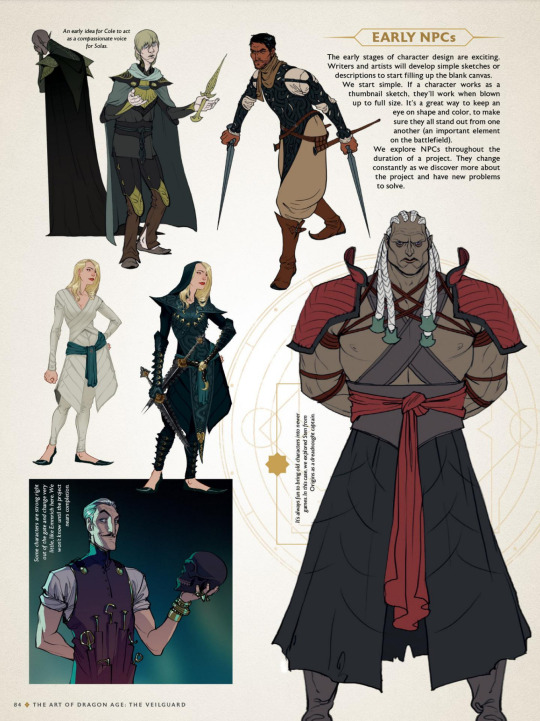
I don’t necessarily hate The Veilguard (I might actually prefer it to Dragon Age II), but I can’t help but notice a pattern in its many problems – a pattern that stems from a lack of faith in the audience and a smothering commitment to safety over boldness. As I examine its narrative and roleplaying nuances, I wish to avoid comparing it to groundbreaking RPGs such as Baldur’s Gate 3 (2023) or even Dragon Age: Origins (2009), as the series has long been diverging from that type of old-school CRPG. Rather, except when absolutely necessary, I will only qualitatively compare it to Inquisition, its closest relative.
And nowhere does it come up shorter to Inquisition than in the agency (or lack thereof) bestowed to the player to influence their character and World State.
II. Damnatio Memoriae
No, that’s not the name of an Antivan Crow (though I wouldn’t blame you for thinking so, since we have a character named “Lucanis Dellamorte”). It’s a Latin phrase meaning “condemnation of memory”, applied to a reviled person by destroying records of their existence and defacing objects of their legacy. In this case, it refers to the player. When it comes to their influence over the world and their in-game avatar, The Veilguard deigns to limit or outright eliminate it.
Save transfers that allow for the transmission of World States (the carrying over of choices from the previous games) have been a staple of the Dragon Age and Mass Effect franchises. Even when their consequences are slight, the psychological effect that this personalization has on players is profound, and one of many reasons why fans grow so attached to the characters and world. At its core, it’s an illusion, but one that’s of similar importance to the illusion that an arbitrary collection of 1s and 0s can create an entire digital world. Player co-authorship guarantees a level of emotional investment that eclipses pre-built backgrounds.
However, The Veilguard limits the scope to just three choices, a dramatic decrease from the former standard. All import options come from Inquisition, with two just from the “Trespasser” expansion. One variable potentially impacts the ending, while the other two, in most cases, add one or two lines of dialogue and a single codex entry. Inquisition, by contrast, imported a bevy of choices from both previous games. Some of them had major consequences to quests such as “Here Lies the Abyss” and “The Final Piece”, both of which incorporated data from two games prior. The Veilguard is decidedly less ambitious. Conspicuously absent options include: whether Morrigan has a child or not, the fate of Hawke, the status of the Hero of Fereldan, the current monarchs of Fereldan and Orlais, the current Divine of the southern Chantry, and the individual outcomes of more than two dozen beloved party members across the series. Consequently, the fourth installment awkwardly writes around these subjects – Varric avoids mentioning his best friend, Hawke, as does Isabela ignore her potential lover. Fereldan, Orlais, and the Chantry are headed by Nobody in Particular. Morrigan, a prominent figure in the latest game, makes no mention of her potential son or even her former traveling companions. And the absence of many previous heroes, even ones with personal stakes in the story, feels palpably unnatural. I suspect this flattening of World States into a uniform mold served, in addition to cutting costs, to create parity between multiple cooperative players during the initial live-service version of Morrison. Again, the compromises of the troubled production become apparent, except this time, they’re taking a bite out of the core narrative.
Moreover, the game’s unwillingness to acknowledge quantum character states means that it’s obliged to omit several important cast members. At this point, I would’ve rather had them establish an official canon for the series rather than leaving everything as nebulous and undefined as possible. That way at least the world would’ve felt more alive, and we could’ve gotten more action out of relevant figures like Cassandra, Alistair, Fenris, Merrill, Cole, and Iron Bull. Not to mention that The Veilguard’s half-measure of respectful non-intereference in past World States ultimately fails. Certain conversations unintentionally canonize specific events, including references to Thom Rainier and Sera, both of whom could go unrecruited in Inquisition, as well as Morrigan’s transformation into a dragon in the battle with Corypheus in that game’s finale. But whatever personal history the player had with them doesn’t matter. The entire Dragon Age setting now drifts in a sea of ambiguity, its history obfuscated. It feels as gray and purgatorial as Solas’s prison for the gods.
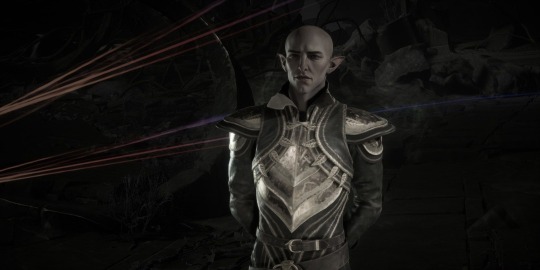
Beyond obscuring the past, The Veilguard restrains the player’s agency over the present. When publications first announced that the game would allow audiences to roleplay transgender identities and have that acknowledged by the party, I grew very excited – both at the encouraging representation, and at the depth of roleplaying mechanics that such an inclusion suggested. Unfortunately, The Veilguard offers little in roleplaying beyond this. The player character, Rook, always manifests as an altruistic, determined, friendly hero, no matter what the player chooses (if they’re offered choices at all). The selections of gender identity and romantic partner constitute the totality of how Rook defines themselves, post-character creation – exceptions that prove the rule of vacancy. Everything else is set in stone. The options presented are good, and should remain as standard, but in the absence of other substantive roleplaying experiences, their inclusion starts to feel frustratingly disingenuous and hollow, as if they were the only aspects the developers were willing to implement, and only out of obligation to meet the bare minimum for player agency. In my opinion, it sours the feature and exudes a miasma of cynicism.
Actual decisions that impact the plot are few and far between, but at least we have plenty of dialogue trees. In this type of game, dialogue options might usually lead to diverging paths that eventually converge to progress the plot. You might be choosing between three different flavors of saying “yes”, but as with the World States, that illusion of agency is imperative for the roleplaying experience. The Veilguard doesn’t even give you the three flavors – the encouraging, humorous, and stern dialogue options are frequently interchangeable, and rarely does it ever feel like the player is allowed to influence Rook’s reactions. Relationships with companions feel predetermined, as the approval system has no bearing on your interactions anymore. There are so few moments for you to ask your companions questions and dig in deep compared to Inquisition. Combined together, these issues make me question why we even have dialogue with our party at all. Rook adopts the same parental affect with each grown adult under their command, and it feels like every conversation ends the same way irrespective of the player’s input. With the exception of the flirting opportunities, they might as well be non-interactive cutscenes.
Rook’s weak characterization drags the game down significantly. With such limited authorship afforded to the player, it’s difficult to regard them as anything more than their eponymous chess piece – a straightfoward tool, locked on a grid, and moving flatly along the surface as directed.
III. Dull in Docktown
On paper, a plot summary of The Veilguard sounds somewhere between serviceable and phenomenal: Rook and Varric track down Solas to stop him from tearing down the Veil and destroying the world. In the process, they accidentally unleash Elgar’nan and Ghilan’nain, two of the wicked Evanuris who once ruled over the elven people millenia ago. With Solas advising them from an astral prison, Rook gathers a party together to defeat the risen gods, along with their servants and sycophants. Over the course of the adventure, they uncover dark truths about the origins of the elves, the mysterious Titans, and the malevolent Blight that’s served as an overarching antagonistic force. Eventually, Rook and friends join forces with Morrigan and the Inquisitor, rally armies to face off with their foes, and slay both the gods and their Archdemon thralls before they can conjure the full terror of the Blight. As Solas once again betrays the group, Rook and company have to put a decisive stop to his plans, which could potentially involve finally showing him the error of his ways.
The bones of The Veilguard’s story are sturdier than a calcium golem. Problems arise when you look at the actual writing, dialogue, and characterization – the flesh, blood, and organs of the work.
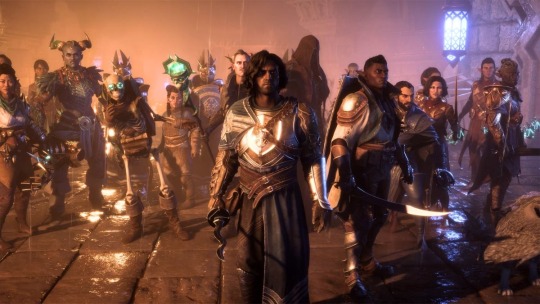
I’ve seen others chide the writing as overly quippy, but that better describes previous titles. Rather, I think The Veilguard’s dialogue is excessively utilitarian and preliminary, like a first draft awaiting refinement. Characters describe precisely what’s happening on screen as it’s happening, dryly exposit upon present circumstances, and repeat the same information ad nauseum. This infuriating repetition does little to reveal hidden components of their personalities, or their unique responses to situations. You won’t hear anything like Cole’s cerebral magnetic poetry or Vivienne’s dismissive arrogance. Many exchanges could’ve been uttered by Nobody in Particular, as it’s just dry recitation after recitation. It almost feels like watching an English second language instructional video, or a demonstration on workplace safety precautions. Clarity and coherence come at the cost of characterization and charisma.
Words alone fail to make them interesting. Most companions lack the subtlety and depth I had come to expect from the franchise, with many conversations amounting to them just plainly stating how they’re feeling. Most rap sessions sound like they’re happening in a therapist’s office with how gentle, open, and uncomplicated they feel. Compare this to Inquisition, where every character has a distinct voice (I should know, I had to try to copy them for that stupid application), as well as their own personal demons that it betrays: Sera’s internalized racism, hints of Blackwall’s stolen valor, Iron Bull’s espionage masked by bluster, or Solas’s lingering guilt and yearning for a bygone age. These aspects of their characters aren’t front and center, but things the audience can delve into that gives every moment with them more texture. The Veilguard’s companions lay out all their baggage carefullly and respectfully upfront, whether it’s Taash’s multiculturalism and gender identity issues or Neve’s brooding cynicism towards Tevinter’s underbelly. You’ve plumbed the depths of their personas within the first few minutes of meeting most of them.
Small exceptions exist. Professor Emmerich Volkarin stands out from the rest of the cast as a particularly inspired character: a charming, Vincent Price-like necromancer. His attachment to tombs and necromancy as a way to cope with his crippling fear of death makes for curiously compelling melodrama. The way in which he ultimately has to face his fear – either by foregoing his opportunity for immortality to save his beloved skeletal ward, Manfred, or by allowing his friend to pass on so that he can transcend into a new type existence – rises above the other binary choices in the game by being both narratively interesting and legitimately difficult to judge. Still, I feel Emmerich’s whole “lawful good gentleman necromancer” conceit, while a unique and clever subversion of tropes, would’ve worked better if it actually contrasted with anyone else in the party. Instead, the whole crew is full of unproblematic do-gooders who are forbidden by the game to nurture any meaningful interpersonal conflict. While I’d appreciate this lack of toxicity in my real-life relationships, fictional chemistry demands more reactive ingredients.

The Veilguard’s developers frequently positioned the game as “cozy” and about a “found family”, but I can guarantee you that there’s more tension at my Thanksgiving dinners than there is anywhere in this title. This family would get along swimmingly even during a presidential election. The thing about the “found family” trope is that it’s more satisfying when it’s earned. Here, it represents the default state, the starting point, and the status quo that they will always return to. Any minor squabbles (Harding wanting to sleep in the dirt, Emmerich taking too many books on a camping trip, Taash not liking necromancy) are introduced and squashed within the same scene. They all feel so extraneous. There’s so little friction among the companions here that you’d think it disproves Newton’s Third Law. The previous games never struggled in this regard, which makes the choices here all the more baffling.
Beyond the intra-party dynamics, characters lack grit or darkness to them – even when the narrative absolutely calls for it. Remember how I described the necromancer as lawful good (to use traditional Dungeons and Dragons alignments)? Yeah, that’s every character. Even the demonic assassin. Lucanis is a notorious hitman possessed by a demon of Spite, and possibly the weakest character of the game. This may or may not be due to the fact that his writer, Mary Kirby, was laid off mid-development. Regardless, he has noticeably less content than the other party members and generally feels unfinished. The demonic possession storyline goes nowhere; he doesn’t exorcise Spite, nor does he learn more about it or how to live with it. Instead, Spite is just an excuse to give Lucanis cool spectral wings (which he will use to fail several assassination attempts). The demon itself mostly just comes across as rude rather than threatening. The biggest issue, however, stems from the absence of any edge to Lucanis. When confronting his traitorous cousin, Ilario – the man who sold out Lucanis’s family to an enemy faction, kidnapped his grandmother, and made multiple attempts on his life – our grizzled, hardened assassin, pushed to the brink, demands… due process. Seriously, if your choices have led Lucanis to have a hardened heart, his method for dealing with the grievous traitor is sending him to jail. That’s The Veilguard’s idea of vindictive brutality among a clan of unforgiving murderers-for-hire. By contrast, Inquisition features Sera insubordinately murdering a stuck-up nobleman for talking too much. I believe that if modern BioWare had written The Godfather (1972), it would’ve ended with Michael Corleone recommending his brother-in-law to attend confession and seek a marriage counselor.
The writers seem intent on making the cast wholly unproblematic, with no way that the audience could ever question their morality or taste the delicious nuance of seeing someone you like do something bad. Measures were taken to child-proof every aspect of the good guys so that they couldn’t possibly be construed as anything else – even if it constricts them to the point of numbness and eventual atrophy.
To make things as palatable and accessible as possible, the language itself was dumbed down. Characters make frequent use of neologisms and bark phrases like “Suit up,” or “These guys go hard.” It emulates popular blockbuster superhero stuff rather than staying true to the diction the series traditionally employed. It’s all about the team, and the entire Dragon Age world has been stripped down into simplistic conflicts and recognizable stock characters.
This is why The Veilguard’s story largely fails. Despite being ostensibly being about the characters, they come off as an afterthought. Most of the time, only the sole requisite follower has anything to say on a given mission. Even in combat, their wholeness as fully-implemented party members falls short of expectations. Their damage output pales in comparison to the Rook’s, they have no health and cannot be downed in battle, and they mainly exist to give the player three extra ability slots. That’s the game’s true ethos for the companions, whether in combat or dialogue – utility, tools to make things happen rather than elegantly crafted identities. We end up with the largest amount of content per companion among any game in the franchise, only to have the weakest roster.
I know these writers can do better, because I’ve seen them do better. Trick Weekes wrote Iron Bull, Cole, and Solas in Inquisition, as well as Mordin Solus and Tali’Zorah in Mass Effect 2 (2010) and Mass Effect 3. Mary Kirby wrote Varric throughout the series, as well as Sten and Loghain in Origins. Plenty of other experienced writers, such as Sylvia Feketekuty and John Dombrow also contributed, so I can’t put any of the blame on a lack of skill. I don’t know if the mistake was trying to appeal to a wider audience, or if the constant reorientations of the DA4 project drained the crew’s passion and left them lacking in time to polish things.
I personally suspect that the writers had to rush out a script for all of the voiced dialogue. A video from August of 2020 showed off the voice actors for Davrin and Bellara, more than four years before the final game’s release. I think the codex entries, letters, and missives that you find throughout the game, which consist of only text, are much better written than the dialogue. My theory is that the writers had more time to revise and spruce up these tidbits, where edits were minimally invasive, as far as production is concerned. But my knowledge is limited; after all, BioWare rejected my application almost a decade ago.
Still, there are aspects of The Veilguard’s plot that I enjoy. The lore reveals were particularly satisfying2, and many felt rewarding after a decade of speculation. I called that elves were originally spirits, as well as the connection between the Archdemons and the Evanuris, but I wouldn’t have guessed that the Blight formed out of the smoldering rage of the Titans’ severed dreams. I’d concisely describe The Veilguard’s story as the opposite of Mass Effect 3: Whereas ME3 did excellent character work, the characterization in The Veilguard leaves much to be desired. Whereas ME3’s tone was overwhelmingly grim, The Veilguard feels inappropriately positive. Whereas ME3’s lore reveals ruined much about the series’s mystique, The Veilguard’s helped tie the setting’s history together. And whereas ME3 fumbled the ending about as much as it possibly could, The Veilguard actually coalesces into a spectacular third act.
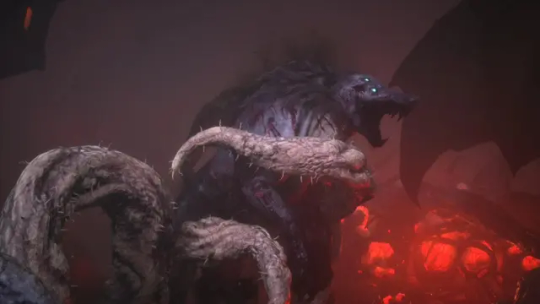
While I think the twist with Varric’s death is weak (outright pitiful compared to the Dread Wolf twist of Inquisition), the actual events that make up the finale carry a momentum and urgency that the rest of the game severely lacked. Everything from the sacrifice and kidnapping of Rook’s companions to the slaying of Ghilan’nain to the awe-inspiring battle between the Dread Wolf and Archdemon Lusacan – the whole affair takes the best parts of Mass Effect 2’s Suicide Mission and elevates it to the scale of an apocalyptic series finale. Ultimately, Solas takes center stage as the final antagonist, and the drama crescendos to a height the rest of the game desperately needed. He remains the most interesting character in the game and perhaps the franchise, and thankfully, the resolution to his story did not disappoint me (though I would’ve preferred the option for a boss battle against his Dread Wolf form if the player’s negotiations broke down). So in that sense, I think the worst possible scenario was avoided.
But is that really worth celebrating? Averting complete disaster? Exceeding the lowest standards? In many regards, The Veilguard still could have been – should have been – more.
IV. A World of Tranquil
In my essay on Final Fantasy VII: Rebirth (2024), I briefly discussed a trend in media to sand off the edges so as not to upset the audience in any way. The encroachment of this media sanitization seems to be an over-correction to the brimming grimness of late 2000s and early 2010s fiction (to which the first two Dragon Age titles belong), which earned comparable levels of criticism. Like Solas, I occasionally feel trapped in a cycle of regret, where it feels like our previous yearning for less aggressive, mean-spirited content led to a media landscape that prioritized patronizingly positive art. Now it’s clear to me that, in order to have a point, you need to have an edge.
Dragon Age historically drew a very progressive audience, and many of them congregated around Tumblr in that website’s heyday. Tumblr has garnered something of a reputation for overzealous discourse and sensitivity among its userbase, and I think that the developers of The Veilguard, in an attempt to cater to one of their core audiences, may have misunderstood both that passion and the fundamental appeal of their products. They became so concerned about optics, about avoiding politically charged criticism, that they kneecapped their world-building, rendering it as inoffensive and sterile as possible. It’s not so much “PC culture” as it is “PG culture.”
To that end, the various governments, factions, and societies of Thedas lost their edge. Dragon Age previously presented itself as anti-authoritarian by showcasing the rampant abuses of power across all cultures. Whether it was the incarceration of mages under the Chantry, the slavery practiced by the Tevinter Imperium, the expansionist anti-individualism of the Qun, the restrictive dwarven caste system, or the rampant racism against elves, social strife abounded in this world. I think that’s one thing that drew so many marginalized fans to the series. But the correlation of fictional atrocities with those of real life frequently prompted volatile discourse, with many concerned about how allegedly allegorized groups were being represented. You began to see countless essays pop up by folks who use the phrase “blood quantum” more than any healthy person should for a setting about wizards. BioWare responded to this by making Thedosian society wholly pleasant and the people in power responsible and cool and the disparate cultures tolerant and cooperative. If nothing’s portrayed negatively (outside of the cartoonishly evil gods), nobody can take offense, right?
For starters, the Antivan Crows have gone from an amoral group of assassins to basically Batman. These figures, which previously purchased children off slave markets to train them into killers, are now the “true rulers” of Antiva, by which the official government derives its authority. The Crows in The Veilguard stand against the insurgent qunari army as heroes of the common folk. They’re not an unscrupulous faction that Rook is reluctantly forced to ally with for the greater good; no, the Crows are simply good guys now. When the pompous governor of Treviso rails against them, with such audacious claims as “assassins and thugs should not represent the citizenry,” we’re meant to laugh at the governor’s foolishness. The unintentional implication this sends is that lethal vigilantism and unchecked power are cool because the people who use it are cool and stylish. The slave trade goes unacknoweldged; Antivan children want to grow up to be assassins now. The Crows never do anything wrong in The Veilguard – the governor is later revealed to be cooperating with the invaders for their own power. BioWare avoids the unpleasantness inherent in the Crows’ concept by pretending it never existed.
Perhaps more ridiculous is the Lords of Fortune, a new faction of pirates and treasure hunters based out of Rivain. Except they don’t really do piracy or treasure hunting. The game goes to lengths to ensure that the audience knows that the Lords don’t steal important cultural artifacts from any of the tombs and ruins they raid. What do they steal, then? There is no such thing as an ethical treasure hunter – plundering indigenous sites for souvenirs is inherently problematic – but the writers wanted to reap the appeal of adventurous swashbucklers without any of the baggage, regardless of whether it makes sense or not3. It comes across as a child’s idea of a pirate: they’re not thinking about the murder and looting, just the funny men with eye-patches who say “ARRR!” The developers want us to like the Lords of Fortune, and to that end, they can’t do anything culturally insensitive – even fictional disrespect toward a made-up culture. This is doubly amusing because the Lords are represented by Isabela from Dragon Age II. The same Isabela that kicked off a war with the qunari by stealing their holy book, the Tome of Koslun. This irony goes unacknowledged by the game.4
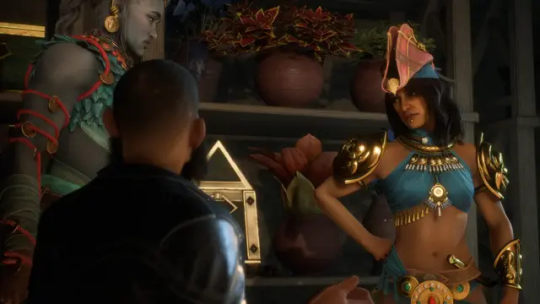
When these rogue buccaneers aren’t busy giving land acknowledgments to displaced Dalish elves or whatever, they’re enjoying their nonviolent coliseum. Pirates revel in bloodsport, but only so long as no actual blood is spilled. The Lords refuse to fight prisoners or animals in their arena, as they find such acts too cruel. I guess they’re all big Peter Singer readers. Instead, they summon spirits to adopt the visages of common enemies so that the player can kill them with a clean conscience. It’s another example of wanting to have your cake and eat it too – they wanted to create a glory hunter/gladiator faction, but couldn’t stand the underlying implications of such. So they twisted and bent them to fit into their unproblematic paradigm, leaving the Lords flavorless and lame. They barely even contribute to the main story, and they’re practically the only look we get into Rivaini society (which remains criminally underdeveloped).
More tragic is the handling of the qunari, once one of the most unique and nuanced civilizations in the Dragon Age setting. The Qun, as portrayed in the first three installments, is a society that demands all of its composite parts work in harmony. Thus, they have predetermined vocations for their children, rigid gender roles, strict codes of conduct, and an ambition to “enlighten” the rest of the world. While the Qun has often been presented as antagonistic toward the heroes, the series has commonly balanced its portrayal by showing how seductive its absolutism can be for people without hope. In some cases, life under the Qun is preferable, as is the case with former Tevinter slaves. Conformity becomes comfort when the world is regularly threatening to split apart.
The Veilguard opts for a different approach. See, Rook’s not fighting members of the Qun in this game – they’re fighting the Antaam, the former qunari military. The Veilguard constantly reiterates that the Antaam, which makes up one of the three branches of the Qun, has broken off and decided to invade, pillage, and stoke chaos. BioWare didn’t want the questionable morality and complexity of fighting an invading people from a humanized, multi-faceted culture, so they removed their culture. Their efforts to turn the non-Western-coded qunari into something digestible for their mistaken conception of a modern audience instead results in two caricatures: one being a fetishized, perfect society where there are no perceivable social ills; and the other a bunch of rampaging brutes.
Contending with a realized conception of Plato’s Republic mixed with the Ottoman Empire makes for more compelling drama than a horde of murderous giants. Again, BioWare wanted to have it both ways, and they still needed nameless, faceless orcs to kill. So every bit about the qunari’s militancy, imperialism, and repression coexisting alongside some of their more progressive ideas and communal unity is stripped of its context and meaning. Blame is placed solely on the Antaam, who no longer represent (and retroactively, never represented) the Qun’s ideology. It’s a cowardly compromise, attempting to pin the blame of all the Qun’s failings on a renegade military and seeking to exonerate the political and social apparatuses of their culpability.
At one point, a minor character named Seer Rowan lectures to an ignorant human (a proxy for the audience absorbing these retcons) that qunari society has always been egalitarian in practice, with mages enjoying freedom there. Previous games showed that the qunari shackle their “saarebas” mages, stitch their mouths, cut out their tongues, and teach them to commit suicide if they ever stray from their masters. However, we’re now assured that this is only practiced under the Antaam, and No True Qunari would ever do such a thing. Ignore the fact that, in Inquisition, we witness the enslaved saarebas under the supervision of the Ben-Hasserath, a subdivision of the Ariqun (i.e. not part of the Antaam). In fact, the Antaam that Rook fights in The Veilguard never command saarebas at all. They’re completely absent from the game (likely because the image of the bound, mutilated minority was too much for The Veilguard’s sensibilities). Seer Rowan’s weak, conciliatory retcon can’t even justify itself in its own game. The scolding diatribe communicates an intrinsic misunderstanding of the Qun by the writers – namely, it continues the pattern established with the Antivan Crows that the mechanics of power in society are fundamentally good as long as aberrant forces aren’t in charge. While I understand the desire to be conscientious about the portrayal of fictional cultures that draw upon non-Western traditions and iconography (which have historically been demonized in media), glamorizing the Qun and stripping it of its realistic nuance does little to alleviate any problems with representation. If anything, it creates new ones.
But hey, now we have our faceless orcs to guiltlessly slaughter. That’s what the Antaam’s been reduced to, bereft of the ideology that made them people. We kill them because they’re strange and scary and foreign and seeking to destroy our cities for fun. They remain the most prominent representation of the qunari in-game, barring our party member Taash. BioWare’s attempts to reverse what they viewed as problematic components to the qunari instead devolved into the very tropes they wished to avoid.
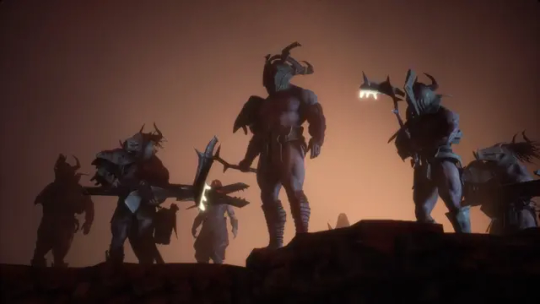
Which leads us to the elves. Much of the series’s discourse has surrounded the portrayal of the long-suffering elven people, who endure slavery under Tevinter, expulsion from their homeland in the Dales, confinement in ghettos, and the general disdain from other races. The games’ stories use symbolic shorthand of real-life oppressed peoples to communicate these tragedies, and this has led to a variety of intense, emotional interpretations over the years. The unending misery of the systematically marginalized elves hasn’t gone unnoticed by the fanbase – and their criticisms haven’t gone unnoticed by the developers. To quote The Veilguard’s creative director, John Epler, in an interview with Polygon:
“Dragon Age has not always been the kindest to the Dalish [elves]. Somebody once made a joke to me, and it’s not untrue, that it’s possible to wipe out a Dalish clan in all three of the games in some way.”
He and others on the development team must’ve thought elves needed a break, because the omnipresent racism against them vanishes completely in The Veilguard. Tevinter, an empire built on the back of chattel slavery, doesn’t show any of that. Consequently, it feels like players in the know still haven’t seen the true face of Tevinter, despite spending half a game there. The notion that the capital of Minrathous gives now is one of a prosperous city that’s centuries ahead of the countries down south, rather than a cruel regime cracking the whip at every opportunity. Perhaps the writers weren’t comfortable portraying this, or felt that their audience might not be amenable to it after years of incendiary argumentation. Nevertheless, it castrates their established world-building and robs us of the opportunity to witness true elven liberation in the climax. With both the fall of Minrathous and the toppling of the tyrannical elven gods, we could have delivered a much needed catharsis after four games of oppression, but The Veilguard forgoes this storytelling opportunity to play it safe.
I worry that this hesitancy originated from anxieties about the sensitivity of depicting marginalized peoples in brutal, dehumanizing conditions, and how that might look to more fragile viewers. But I think it’s important for all players, watchers, and readers to know that, though there might be aspects shared between them, fictional minorities are distinct from real ones.
Dragon Age’s elves are aesthetically Celtic. Their residency in alienages evokes images of Disapora Jews in Europe. Their Long Walk after being driven from the Dales calls back to the Trail of Tears, sharing an experience with Native Americans. Their subsequent migratory nature is reminiscent of the Romani people. And their ancient empire of Arlathan, with its large columns and temples of worship, headed by ascended humanoid (for lack of a better term) deities that cast down an enemy called the Titans, and which has since had its religion and culture co-opted and renamed by Roman-inspired Tevinter invites comparisons to classical Greece.
My point is, the elves of Dragon Age don’t represent one group of people, because fictional cultures are constructs drawing from countless inspirations. If they represent anything beyond themselves, it’s the idea of a proud people that’s fallen under the yoke of conquering powers – a supervictim to embody all. The idea that one must be limited in their storytelling options based on how the portrayal might reflect upon or disrespect an existing culture is flawed, in my opinion. In the overwhelming majority of cases, coding cannot be read as a 1:1 allegory, especially in speculative fiction like science-fiction and fantasy. I believe the most mature way to evaluate a story isn’t to try to pigeonhole what it’s trying to say say about who, as if there’s some insidious encrypted message in the text. Rather, it’s to see the forest through the trees and interpret the work as a complete whole in itself.
On that basis, I ask: would it have been so bad to see some of those enslaved elves, praying for salvation, side with their manipulative, nefarious gods? To add some nuance to the conflict with Elgar’nan and Ghilan’nain, would the story of elven liberation not have been better if the game actually engaged with it? Could we actually have a moral quandary with those whom Rook ends up fighting, even if the content might be seemingly problematic?
Epler might respond in the negative, per the Polygon interview, claiming that the gods “simply don’t care” about the elves.
“Those blighted, decrepit gods, they’re not bothering with the soft pitch. Their pitch is, We’re going to make a horrible world. We’re going to give you a lot of power, and maybe you’ll be OK.”
Like a chess board, the core conflict of The Veilguard is black and white. BioWare abandoned the chance to make Elgar’nan and Ghilan’nain more interesting villains because it was too risky.
Similarly risky was Solas’s role as an antagonist, since his motivations, as explained in “Trespasser”, are deeply sympathetic. Perhaps too much so for the developers’ comfort. Unlike the Evanuris and their disinterest in the elves, Solas wants to restore the elven people to their former glory. At least, that seemed to be his pitch in the last game. Frustratingly absent from The Veilguard are the Agents of Fen’Harel – elves who swore fealty to Solas’s cause. They infiltrated and compromised the Inquisition, effectively precipitating the final decision to end the organization in its current form. The idea that Solas had amassed an army of common folk who found the idea of a renewed elven empire appealing made him appear formidable and intimidating. “Trespasser” implies that a mass uprising of elves under Solas’s leadership was imminent, and anyone could be in on it.
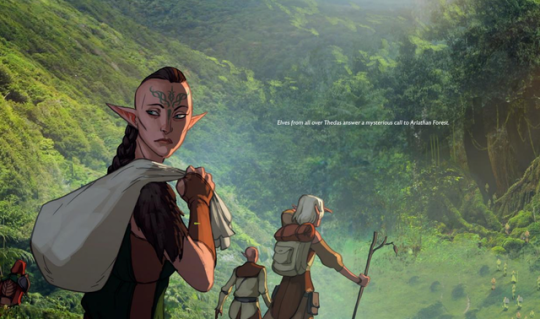
None of this happens in The Veilguard. Not only does Solas lack an army, but their absence isn’t explained or even acknowledged. As a result, Solas remains a passive antagonist until near the end, since the player has no disciples of his to contend with (either physically or ideologically) along the way. It wastes a side of his character that had been foreshadowed in a decade-long cliffhanger – that of a charismatic leader, capable of coordinating a rebellion that could spell disaster for its own followers.
In a Reddit AMA after the latest game’s release, Epler answered where the Agents of Fen’Harel disappeared to:
“Solas’ experience leading the rebellion against the Evanuris turned him against the idea of being a leader. You see it in the memories – the entire experience of being in charge ate at him and, ultimately, convinced him he needed to do this on his own. And his own motivations were very different from the motivations of those who wanted to follow him – he had no real regard for their lives or their goals. So at some point between Trespasser and DATV, he severed that connection with his ‘followers’ and went back to being a lone wolf. There are Dalish clans who are sympathetic to his goals, but even there, there’s an understanding that he’s too dangerous to have a more formal connection with, and that he will, ultimately, sacrifice them to his own ends if necessary.”
I find this explanation unsatisfying, not the least bit because the narrative offers next to nothing to imply this. The disappearance of Solas’s agents represents my biggest bugbear with the game, depriving it of the full potential of its highly anticipated antagonist in favor of the more generically villainous Evanuris. Moreover, this omission fits into the aggravating blueprint for The Veilguard’s inoffensive direction. The motivations, emotions, and backgrounds of the Agents of Fen’Harel would be sympathetic, and therefore might problematize the otherwise cut-and-dry conflicts. Epler seemed concerned that audiences might think Solas was “a little too sympathetic in his goals,” according to an interview with GamesRadar+.
But that’s the thing: sympathy isn’t endorsement, and portrayal of sympathetic characters isn’t endorsement either. But neither does that invalidate the emotions and experiences that generate that sympathy, even if the character’s actions ultimately turn toward evil. I’ve noticed a trend (especially in symptomatic criticism, which I generally dislike5) to view art as propaganda, and to evaluate it from a moralizing, top-down perspective. Antagonists with complex or understandable motivations (in this case, revolutionary villains) are often judged by this framework as tools for stories wishing to champion the status quo. Common arguments that I’ve seen imply that the relatability that we often find in villains is not a strength of the writing, but a devilish trick of ideology by which writers can reinforce conservative doctrine, to scold us away from certain beliefs. Any decent writer knows this isn’t the case, and that people don’t write morally or emotionally complex antagonists for didactic purposes. Instead, characters such as these embody the anxieties of their creators – the fear of losing yourself to your passions, the fear of going about things the wrong way, the fear of sacrificing too much to achieve your desired ends. The concepts and feelings that compel these characters remain authentic to the writer’s heart and the connection they established with the audience.
Art isn’t propaganda. To read it as such reduces it and promotes intellectual dishonesty and foolhardy myopia. Stories are irreducible (otherwise, we would not waste our time with them), and so I believe interpretations should be formed from the bottom-up, rooted in the text as much as possible. The “message” cannot be imposed from the top-down, but symptomatic readings, in their focus on tropes and cultural context, frequently condemn without a trial. Hindering your story in order to future-proof it for the sake of optics is a safeguard against this, and one that leads to bad stories. Artists should have confidence that their text will hold its ground on its own. To quote Ursula K. Le Guin’s essay “A Message about Messages”:
“The complex meanings of a serious story or novel can be understood only by participation in the language of the story itself. To translate them into a message or reduce them to a sermon distorts, betrays, and destroys them… Any reduction of that language into intellectual messages is radically, destructively incomplete.” (67-68)
BioWare’s doctrine of passive writing violates this wisdom by surrendering to their fear of (bad) criticism. The Veilguard lacks punch, stakes, and empathy and becomes incongruous with its established lore because it’s not willing to take risks that might alienate or upset players. They’re more concerned with making sure their work is inoffensive than they are with conveying a moving story.
I believe all of this was inherited from an incestuous feedback loop between a vocal minority of critics, of which I might’ve once counted myself among the blameworthy, and the apprehensiveness of out-of-touch corporate board room decision-making. Dragon Age’s genome mutated, and it slowly lost its teeth.
Over the course of a decade, we bred the Dread Wolf into a Dread Pug.
V. What It Took
The Veilguard’s lack of confidence in itself and lack of faith in its audience contribute to its capitulatory nature. In many respects, it feels like the developers lost their passion for it over the course of the ten year hellish production and just wanted to be done with it. This resulted in a decent game that nonetheless feels divorced from what came before it. It tries to juggle being a soft reboot while also trying to close out the series’s biggest and longest running story arcs, but inevitably fumbles.
Nearly everything done by The Veilguard was handled better by Inquisition. And Inquisition was certainly the more ambitious title. Perhaps more returning characters would have established a sense of continuity between the two, or at least made it less awkward by having them present for the story’s grand finale. For as strong as the endgame is, it could’ve benefited from the presence of slave liberator Fenris, elven history aficionado Merrill, possible Evanuris soul vessel Sera, or Divine Victoria (any of them). The core pillar of Dragon Age is the characters, and The Veilguard’s under-performance (and in some cases, outright dismissal) in that regard sabotages its integrity. Without this to anchor it, the changes to gameplay, visuals, and roleplaying depth become more alienating.
Personally, what do I take away from this? The Veilguard is far from the game I dreamed about for ten years, and not the one that loyal fans deserved either. I’m no stranger to disappointment at this point in my life, and yet this still leaves me with a hollow feeling. Will I still be able to return to Inquisition, a game I truly adore, and see it the same way as before, knowing now where all this is leading? The true cost of The Veilguard, for me, has nothing to do with the price tag: it’s the loss of that perfectly tailored dream, now that the possibilities of the future have shut their gates.
Where do those dreams go? Are they doomed to fester in their lonely, incommunicable agony? Will they be twisted by their enmity, like the blighted dreams of the Titans, and spread their corruption into those important happy memories?
In 2014, I was depressed as fuck, and Dragon Age: Inquisition helped me to see the light and come out of it. In 2024, I was depressed as fuck, and Dragon Age: The Veilguard made me feel nothing. There’s no less favorable comparison in my eyes. It’s disheartening to behold something that once meant so much to me and be greeted with numbness. I have to wonder if that affection will ever return, or if I’ve just grown out of it.
But as I wandered the streets of Minrathous as Rook, I heard a familiar song. It was one of the tavern songs from Inquisition, its nostalgic chords filling me with wistful sentiment. I know, deep down, there’s still something there. Maybe I just need to dig it up. Maybe it’s time to look back…
To be continued…
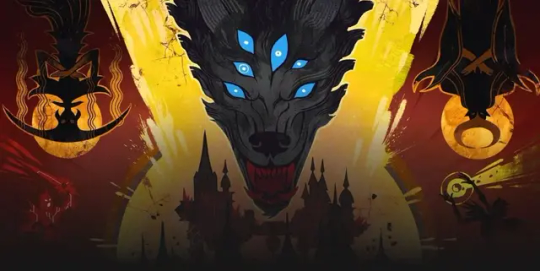
– Hunter Galbraith
Further Reading
Le Guin, Ursula K. “A Message about Messages.” Wonderbook: The Illustrated Guide to Creating Imaginative Fiction, Abrams Image, 2018, pp. 67–68.
Incidentally, this was an anomaly my friends and I pondered over and eventually solved. It turned out to be a former Wienerschnitzel. ↩︎
You could argue that this credit goes more to Inquisition and the previous games for laying the groundwork for said reveals, which were obviously planned out ahead of time, as confirmed by the aforementioned official artbook. Regardless, the payoff satisfied me and gave me proper closure. ↩︎
I’ve been informed that there is a hidden conversation that explains that the Lords of Fortune do, in fact, sell cultural artifacts at times, but only to the rightful owners. This just makes me wonder what they do with the artifacts if the prospective clients can’t pay. Do they shove them back in the ruins and re-arm all the booby traps? ↩︎
I would argue that this does not represent character progression on Isabela’s part, as her (possible, depending on the player’s choices) return of the Tome of Koslun in Dragon Age II was a pragmatic sacrifice she made to save her friends and the city, rather than an acknowledgment of the qunari’s inviolable ownership. In fact, in many continuities, she never returns the Tome at all. ↩︎
I prefer more formalist criticism because it allows the text to lead the dance, not the critique. I think it’s only fair, given that the creators likely spent more effort crafting the piece than I spent consuming it. Symptomatic criticism mandates that the reader consider everything around the text, typically at the text’s expense. In the worst cases, symptomatic critics make their arguments about seemingly everything besides the text in question. ↩︎ Link to article: https://planckstorytime.wordpress.com/2025/01/01/dragon-age-the-veilguard-strangled-by-gentle-hands/
#planckstorytime#writing#analysis#essay#dragon age#datv spoilers#datv rook#dragon age veilguard#veilguard#dragon age inquisition#solas#lace harding#bellara lutare#davrin#elgar'nan#ghilan'nain#neve gallus#taash#lucanis dellamorte#emmerich volkarin#video games#rpg#bioware#dragon age 4#dragon age dreadwolf#da4#tevinter imperium#dorian pavus#inquisitor lavellan#solavellan
292 notes
·
View notes
Text
Arknights and stars
On that topic, Arknights has always had a connection to the stars and its own star map is a bit wonky if compared to earth now but makes sense if you see it in the great scheme of things.
From Astesia's file on, it's been implied that the dome that surrounds Terra is fake, and Kristen is the first one who has gone beyond it so far (traveling from Terra to beyond the dome). It's also said that the reason people cannot navigate the sea reliably is because the stars themselves aren't reliable.
But it's also a bit more concrete that the stars are a bit off, or, it would look like that.
Remember Children of Ursus? Everyone remembers its dark story but few remember the map layout.

This is the Big Dipper, part of the constellation Ursa Maior. Fitting for an event that features bear characters.
But wait! Doesn't the Big Dipper look like this?

It does. But the Big Dipper over 50,000 years looks like this...

Like I pointed out in the previous post, the stars are always on the move. It may seem slow to us but if you take a large enough timescale then the sky sure does shift from what it's now.
Remember this skin of Astesia's?

It sure is a pretty skin. But zoom in on the star chart and you'll find something...peculiar...
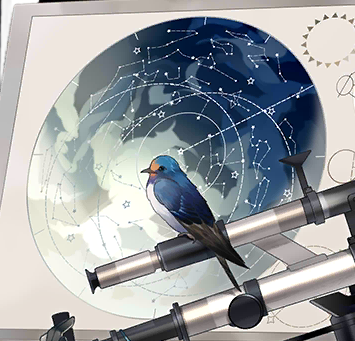
Several constellations look...off. Like Leo, Virgo, Hydra and Gemini. And...
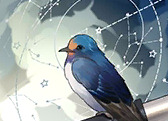
The star that's marked as the North Star (i.e the star in the middle) is not Polaris, but Vega, the largest star in the constellation Lyra! Don't see it? Here, I'll make it a little more clear:

And Lyra how it is now, which is, again, slightly different from how Lyra is depicted in the above image:

Vega is not our current North Star, it's the star Polaris (duh). But Vega was in about 14,000 years ago, and will be again in about 12,000 to 13,000 years in the future. So not our current North Star.

The celestial globe is also tilted at 45 degrees instead of 23,5 for earth.
So! A huge misser on the part of the artist, right?
Wrong!
You see, the ecliptic and equator in the artwork do obviously not align with our current ecliptic and equator. But our equator and ecliptic looking like in the skin can only happen if the precession of the earth's axis is tilted towards the south...which will be the case in 12,000 to 13,000 years from now. At that time, the constellations will look 'off' compared to how they look now (I was talking about the stars shifting over time in my previous post) and Polaris will no longer be the North Star, like in the artwork.
The kicker?
Lone Trail reveals that Terra is at least 13,000 years old.
737 notes
·
View notes
Text

Egyptologists Clash Over ‘Underground City’ Beneath Pyramids
Claims that an “underground city” exists beneath ancient Egyptian pyramids have caused a row among experts.
Researchers from Italy say they have uncovered giant vertical shafts wrapped in “spiral staircases” under the Khafre pyramid.
They said on Sunday that they found a limestone platform with two chambers and channels that resemble pipelines for a water system more than 2,100 feet below the pyramid, with underground pathways leading even deeper into the earth.
But the claims – which have not been published or independently peer-reviewed – were labelled “false” and “exaggerated” by fellow Egyptologists.

Researchers claim they have discovered eight cylinder-shaped structures below the Khafre - Khafre Project.
Prof Corrado Malanga and his team from the University of Pisa used radar pulses to create high-resolution images deep into the ground, similar to how sonar radar maps the ocean.
In a statement, he said: “When we magnify the images [in the future], we will reveal that beneath it lies what can only be described as a true underground city.”
The scientists have also said there is “an entire hidden world of many structures’’ and that “the Pyramid of Khafre might conceal undiscovered secrets, notably the fabled Hall of Records”.
The Hall of Records, a concept popularised in ancient Egyptian lore, is believed to be an ancient library beneath the Great Pyramid or the Sphinx, with vast amounts of information about the ancient civilisation.
Prof Lawrence Conyers, a radar expert at the University of Denver who focuses on archaeology, told the Daily Mail it was not possible for the technology to penetrate that deeply into the ground.
He said the idea that it proves an underground city existed is “a huge exaggeration”.
But he said it was conceivable small structures, such as shafts and chambers, may be present from before the pyramids were built.
He highlighted how “the Mayans and other peoples in ancient Mesoamerica often built pyramids on top of the entrances to caves or caverns that had ceremonial significance to them”.
The work by Prof Malanga and fellow researchers Filippo Biondi and Armando Mei was previously discussed during a briefing in Italy last week.
The project’s spokesman, Nicole Ciccolo, shared a video on Saturday of the trio discussing the findings that are yet to be published in a scientific journal.
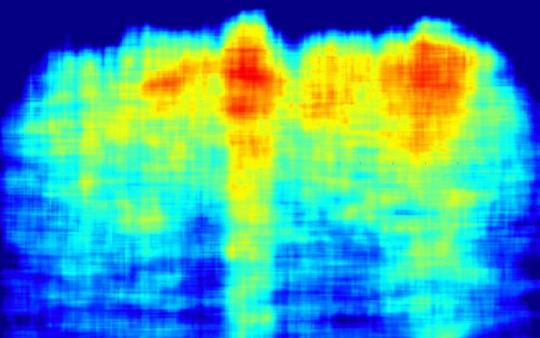
Tomographic images could indicate internal artificial structures under the pyramid - Khafre Project.
The team focused on the Khafre pyramid, which, along with Khufu and Menkaure pyramids, make up the three in the Giza complex.
The pyramids are thought to have been built some 4,500 years ago and sit on the west bank of the Nile river in northern Egypt.
The vertical shafts identified below the ground were about 33 to 39 feet in diameter, located at a depth of at least 2,130 feet, the researchers said, adding that they may support the pyramid, which needs “a strong foundation, otherwise it may sink”.
The team showed an image created by using the pulses which they claim includes “a complex, luminous structure with distinct vibrations” they believe is “an actual underground city”.
“The existence of vast chambers beneath the earth’s surface, comparable in size to the pyramids themselves, have a remarkably strong correlation between the legendary Halls of Amenti,” Ms Ciccolo said.
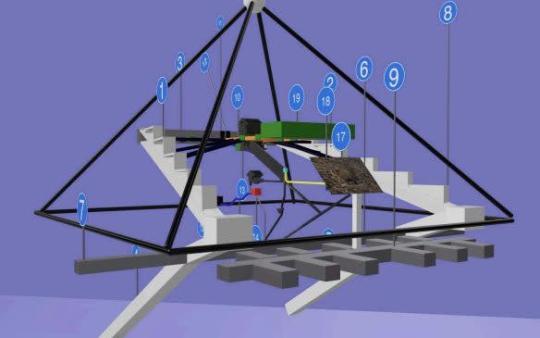
A 3D model displays the structures inside the central part of the Pyramid of Khafre - Khafre Project.
Prof Malanga and Mr Biondi published a separate peer-reviewed paper in October 2022 in the scientific journal Remote Sensing, which found hidden rooms and ramps inside Khafre, along with evidence of a thermal anomaly near the pyramid’s base.
The new study used similar technology but with extra help from satellites orbiting Earth.
Radar signals from two satellites about 420 miles above Earth were directed into the Khafre pyramid.
The experts then monitor how they bounce back and convert the signals into sound waves, which allows them to “see” through the solid stone and map out underground structures in 3D.
Prof Malanga claimed the results had been “completely consistent” and using two satellites ruled out the chance of “misinterpretation”.
By Michael Searles.

View of the ancient crypt inside the Great step pyramid of Djoser, Saqqara. Cairo.
#Egyptologists Clash Over ‘Underground City’ Beneath Pyramids#Scientists using new radar technology find 'vast city' beneath pyramids#Khafre pyramid#Khafre Project#The Hall of Records#ancient artifacts#archeology#history#history news#ancient history#ancient culture#ancient civilizations#ancient Egypt#egyptian history
167 notes
·
View notes
Photo

Here is an update to the map of Gihdmnti, the world of my Midnightverse project! This update features the predominant biomes of each continent and subcontinent! They operate by Fantasy Map Rules because The Raven Plague or something
4 notes
·
View notes
Text
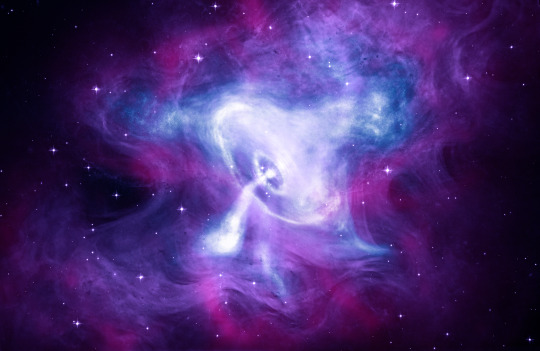
Navigating Deep Space by Starlight
On August 6, 1967, astrophysicist Jocelyn Bell Burnell noticed a blip in her radio telescope data. And then another. Eventually, Bell Burnell figured out that these blips, or pulses, were not from people or machines.

The blips were constant. There was something in space that was pulsing in a regular pattern, and Bell Burnell figured out that it was a pulsar: a rapidly spinning neutron star emitting beams of light. Neutron stars are superdense objects created when a massive star dies. Not only are they dense, but neutron stars can also spin really fast! Every star we observe spins, and due to a property called angular momentum, as a collapsing star gets smaller and denser, it spins faster. It’s like how ice skaters spin faster as they bring their arms closer to their bodies and make the space that they take up smaller.

The pulses of light coming from these whirling stars are like the beacons spinning at the tops of lighthouses that help sailors safely approach the shore. As the pulsar spins, beams of radio waves (and other types of light) are swept out into the universe with each turn. The light appears and disappears from our view each time the star rotates.
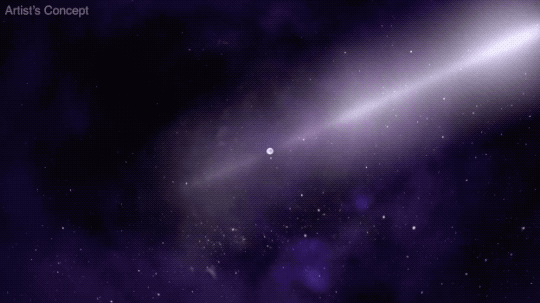
After decades of studying pulsars, astronomers wondered—could they serve as cosmic beacons to help future space explorers navigate the universe? To see if it could work, scientists needed to do some testing!
First, it was important to gather more data. NASA’s NICER, or Neutron star Interior Composition Explorer, is a telescope that was installed aboard the International Space Station in 2017. Its goal is to find out things about neutron stars like their sizes and densities, using an array of 56 special X-ray concentrators and sensitive detectors to capture and measure pulsars’ light.
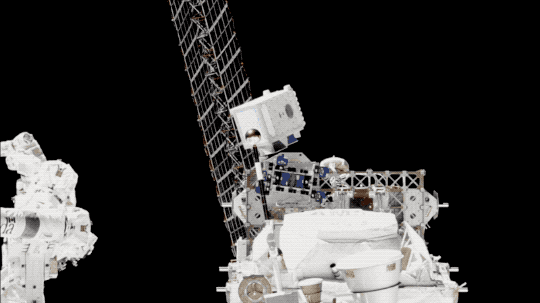
But how can we use these X-ray pulses as navigational tools? Enter SEXTANT, or Station Explorer for X-ray Timing and Navigation Technology. If NICER was your phone, SEXTANT would be like an app on it.
During the first few years of NICER’s observations, SEXTANT created an on-board navigation system using NICER’s pulsar data. It worked by measuring the consistent timing between each pulsar’s pulses to map a set of cosmic beacons.

When calculating position or location, extremely accurate timekeeping is essential. We usually rely on atomic clocks, which use the predictable fluctuations of atoms to tick away the seconds. These atomic clocks can be located on the ground or in space, like the ones on GPS satellites. However, our GPS system only works on or close to Earth, and onboard atomic clocks can be expensive and heavy. Using pulsar observations instead could give us free and reliable “clocks” for navigation. During its experiment, SEXTANT was able to successfully determine the space station’s orbital position!

We can calculate distances using the time taken for a signal to travel between two objects to determine a spacecraft’s approximate location relative to those objects. However, we would need to observe more pulsars to pinpoint a more exact location of a spacecraft. As SEXTANT gathered signals from multiple pulsars, it could more accurately derive its position in space.
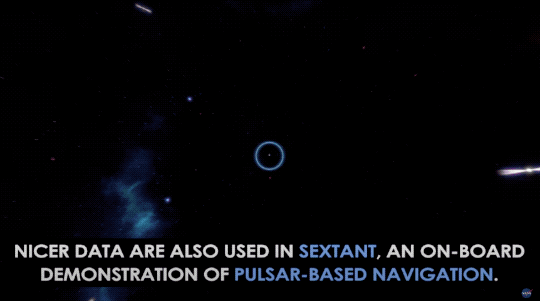
So, imagine you are an astronaut on a lengthy journey to the outer solar system. You could use the technology developed by SEXTANT to help plot your course. Since pulsars are reliable and consistent in their spins, you wouldn’t need Wi-Fi or cell service to figure out where you were in relation to your destination. The pulsar-based navigation data could even help you figure out your ETA!

None of these missions or experiments would be possible without Jocelyn Bell Burnell’s keen eye for an odd spot in her radio data decades ago, which set the stage for the idea to use spinning neutron stars as a celestial GPS. Her contribution to the field of astrophysics laid the groundwork for research benefitting the people of the future, who yearn to sail amongst the stars.
Keep up with the latest NICER news by following NASA Universe on X and Facebook and check out the mission’s website. For more on space navigation, follow @NASASCaN on X or visit NASA’s Space Communications and Navigation website.
Make sure to follow us on Tumblr for your regular dose of space!
#NASA#pulsar#Jocelyn Bell Burnell#spaceblr#space#star#neutron star#deep space#telescope#navigation#universe#astronomy#science
4K notes
·
View notes
Text
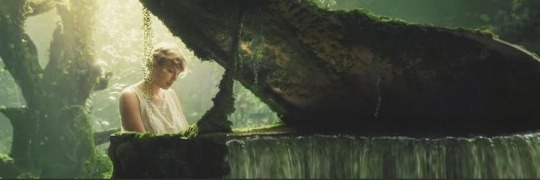
Mini Fic #10
"And you said you'd come and get me, but you were twenty five, and the shelf-life of those fantasies has expired." -theodore nott
Your attic still smells like cedar.
Even now, years later, when the world feels quieter than it should and your feet take you there without asking, the scent hits you like memory. Sweet, sharp, sacred. It smells like summers that stretched too long and ended too fast. It smells like promises whispered beneath blanket forts and flashlight beams. It smells like Theodore.
You always said the attic was a portal. That it held time in its walls, like it might forget to let you grow old if you sat there long enough. He believed you-of course he did. Theo always believed you. He was the kind of boy who wanted the world to be magic. And when magic didn’t come, he created his own.
The two of you spent years pressed into that warm wooden silence, dreaming up futures. You remember the way the dust motes danced in the attic where you'd hide, pretending you were pirates or time travelers or, once, two stars that had fallen to Earth just to find each other again. He used to call you “his second star,” with all the sincerity of a boy who didn’t know how fast the sky would change.
You still have the maps you drew together-old paper soft from years of unfolding, corners worn. His handwriting trails across the borders, spelling out places that never existed. "Theo’s Landing." "Moonchild Cove." "Home."
You kept everything. All of it. The beaded bracelet he made you, too small even then. The birthday letter he forgot to sign. A feather he swore fell from a phoenix, tucked gently into your cedar box beneath the bed. You called them relics. He called them proof.
Sometimes you take them out when you miss the version of yourself that only existed when he was around. The one who believed in forever because he told you to.
You wonder if he meant it when he said he’d come back.
Theodore was your best friend first. Not your first kiss. Not your first heartbreak. But the person who made every other part of growing up bearable.
He was a storm wrapped in quiet. Wild ideas, scraped knees, a boy who ran before he thought and talked like the world would bend for him. And in some ways, it always did. He had that kind of gravity. The kind that pulled people into his orbit and never let them go.
But you-you were his constant. His steady. The quiet beside his storm. While he plotted how to fly, you mapped out how to build wings. You told him stories to help him sleep. You sat on the roof with him when he cried the night his father screamed loud enough to crack the air.
You waited for him when he ran. You stitched his wounds with safety pins and kindness. And when he whispered, "I’ll grow up, then I’ll come find you," you believed him.
Because back then, every word he said felt sacred.
You didn’t cry, not then. You lit a candle in the attic and left it burning for him. A beacon. A promise.
You told yourself it was temporary. Just goodbye for now.
But days turned to years. And years turned cruel.
You tried to keep going. You buried yourself in school, in books, in people who didn’t know how to pronounce his name right. You learned to smile when someone asked, “Whatever happened to that boy you used to hang around with?” You learned to lie.
The world kept spinning. You tried your best to keep up.
You graduated. Fell in love with people who were safe, who didn’t have storm clouds for eyes and a laugh like gravity. People who made plans and kept them. But none of them ever looked at you like you held constellations in your hands. None of them ever said they’d find you across time.
You tried not to compare them, but the ghost of Theo lived in every space they left untouched.
And still-you waited. Not openly. Not in the way people would notice. But quietly. In the small things. A lamp always left on. A toothbrush in the drawer. The way you never quite settled into anyone else’s orbit.
You waited because he said he’d grow up and come back. And back then, you thought growing up was the only thing stopping him.
He was 25 when you saw him again. Not in person-no. That would’ve been too kind.
It was a tagged photo. A group shot at some obscure music festival, buried in the noise of your feed. But there he was. The same smile. Same eyes. Standing next to a girl you didn’t recognize, arm around her waist like it was the most natural thing in the world.
You stared at the photo until your eyes burned. You clicked her profile. You read their inside jokes. You scrolled through their memories like they were yours to grieve.
And then you shut the laptop and turned off the lamp. For good, this time.
Because he was supposed to come find you. He promised. And you knew-you knew-he had the map.
Sometimes, on sleepless nights, you still dream about him.
Not the man in the picture. Not the version of him that belonged to someone else. But the boy who sat on your porch eating popsicles, who once said you were his favorite person in the whole galaxy. The one who believed in Neverland and second stars and forever.
You dream of what might’ve been. Of a life where he came back, older and sun-touched and full of stories, saying, “Sorry I took so long. I had to make sure I was worth finding.” You dream of sitting side by side again in the attic, your knees touching, the world quiet and small and safe.
And you wonder if that version of him dreams of you too.
But reality is quieter now.
You live a life that’s good, mostly. Full of people who love you in the ways they can. Full of laughter, art, warm drinks, and soft places to land. You no longer look for Theo in every stranger’s face. You no longer leave space for him in your plans.
But you still have the cedar box under your bed. The one filled with memories so carefully folded, so heartbreakingly preserved.
You don’t open it often. But when you do, it’s like finding yourself again. The younger version of you who believed in impossible promises. Who loved him with a kind of fierce, innocent hope you’re not sure you’ll ever find again.
"Forgive me, Theodore," you whisper once more. "Please know I tried."
You tried to stay the same, even as the world pulled you forward. You tried to wait long enough for him to catch up. You tried to believe in magic, even after he stopped.
You hold those days gently now. With the tenderness of someone who understands that sometimes, love doesn’t end in reunion. Sometimes, it just becomes a part of who you are. A soft ache. A quiet lesson. A reminder that even the deepest promises can fade with time.
And maybe, that’s okay.
Because you loved a boy who called you his second star. And for a while, he made you believe you could fly.
#slytherin boys#hogwarts school of witchcraft and wizardry#harry potter#slytherin#slytherin aesthetic#my works#theo nott#ask the rizzler#mini fic event!#mini fics#mini fic#theo nott x you#theodore nott x you#theo nott x y/n#theo nott angst#theodore nott x y/n#theo nott x reader#theodore nott x reader#theodore nott smut#theo nott smut#theodore nott
105 notes
·
View notes